The S ndy Pig
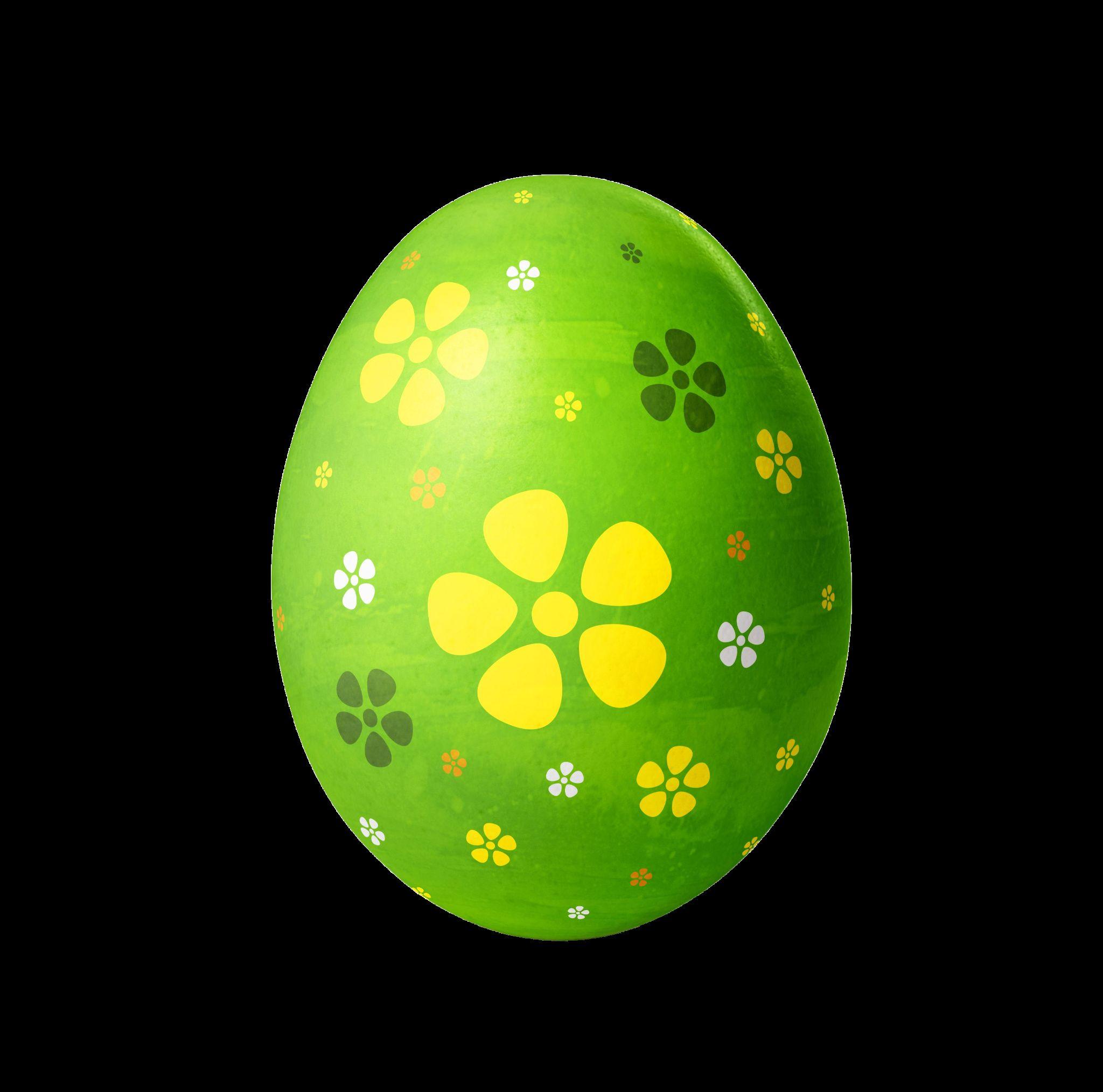
Issue 4 Spring 2023
OSBPG Pork Labels

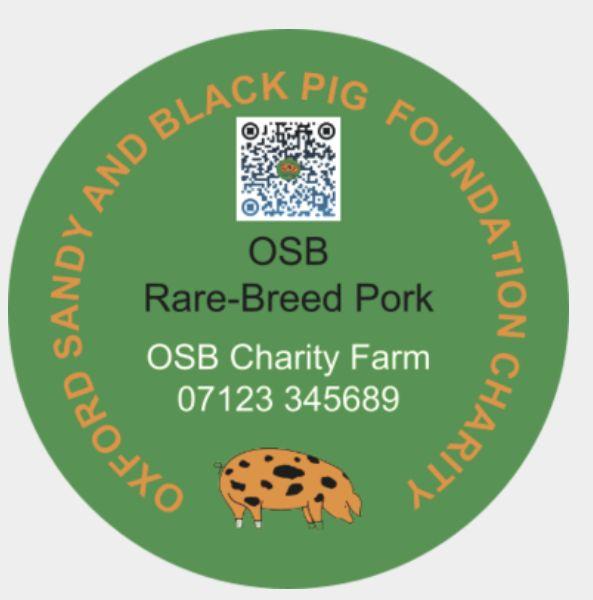
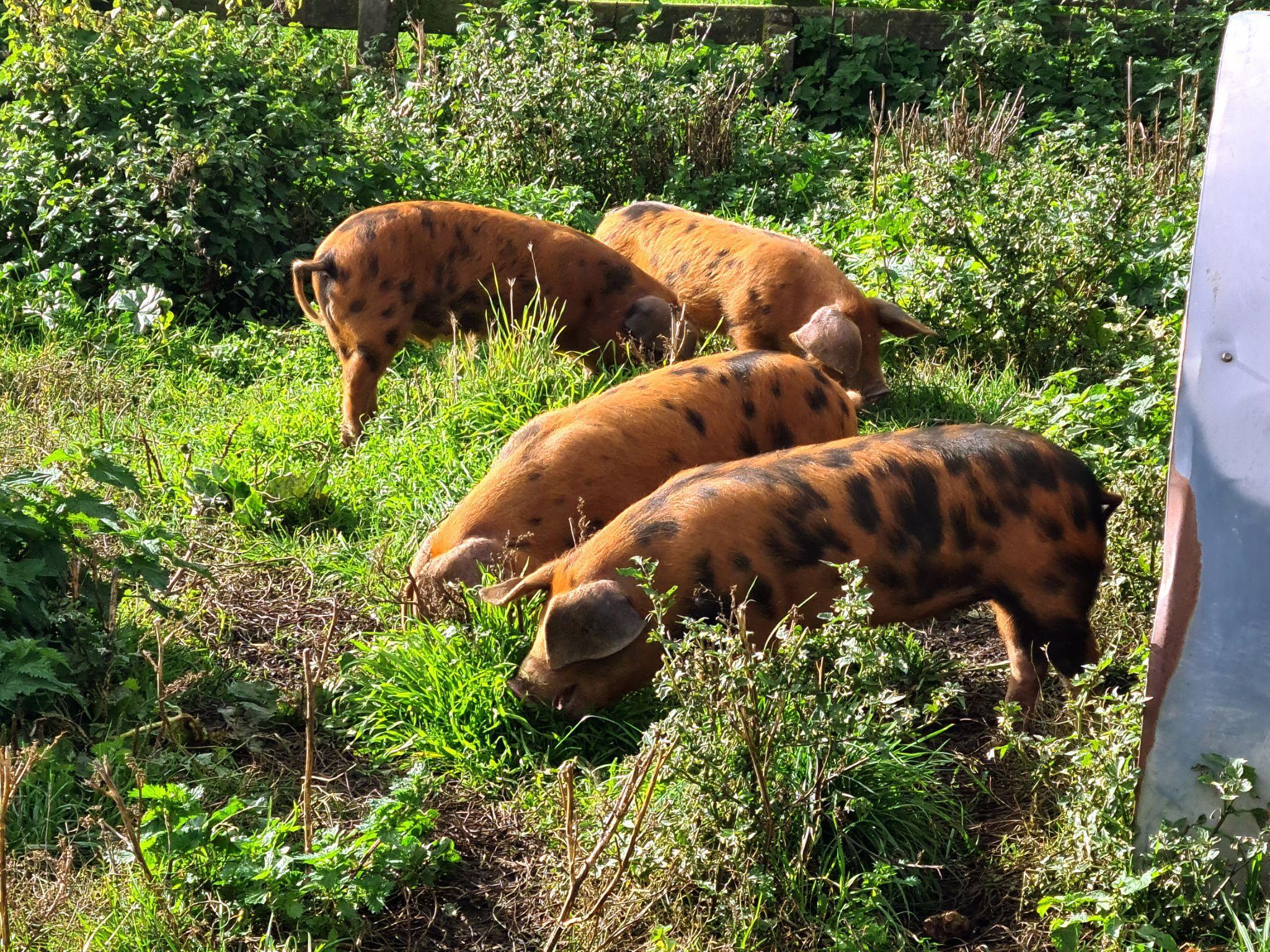
OSBPG 2022 Award Winners Farming through the eyes of a child
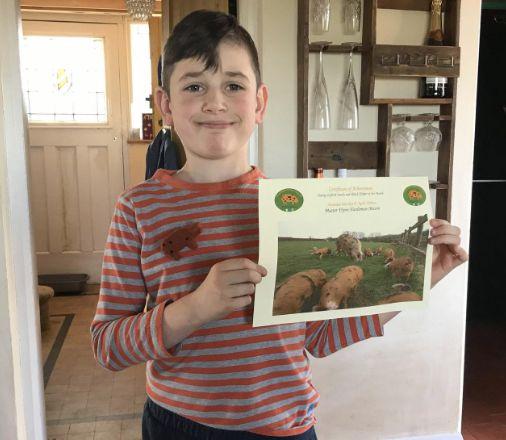
 Photo by Eugenia Porechenskaya
Oxford Sandy and Black Pig Foundation
Charity Magazine
Photo by Eugenia Porechenskaya
Oxford Sandy and Black Pig Foundation
Charity Magazine
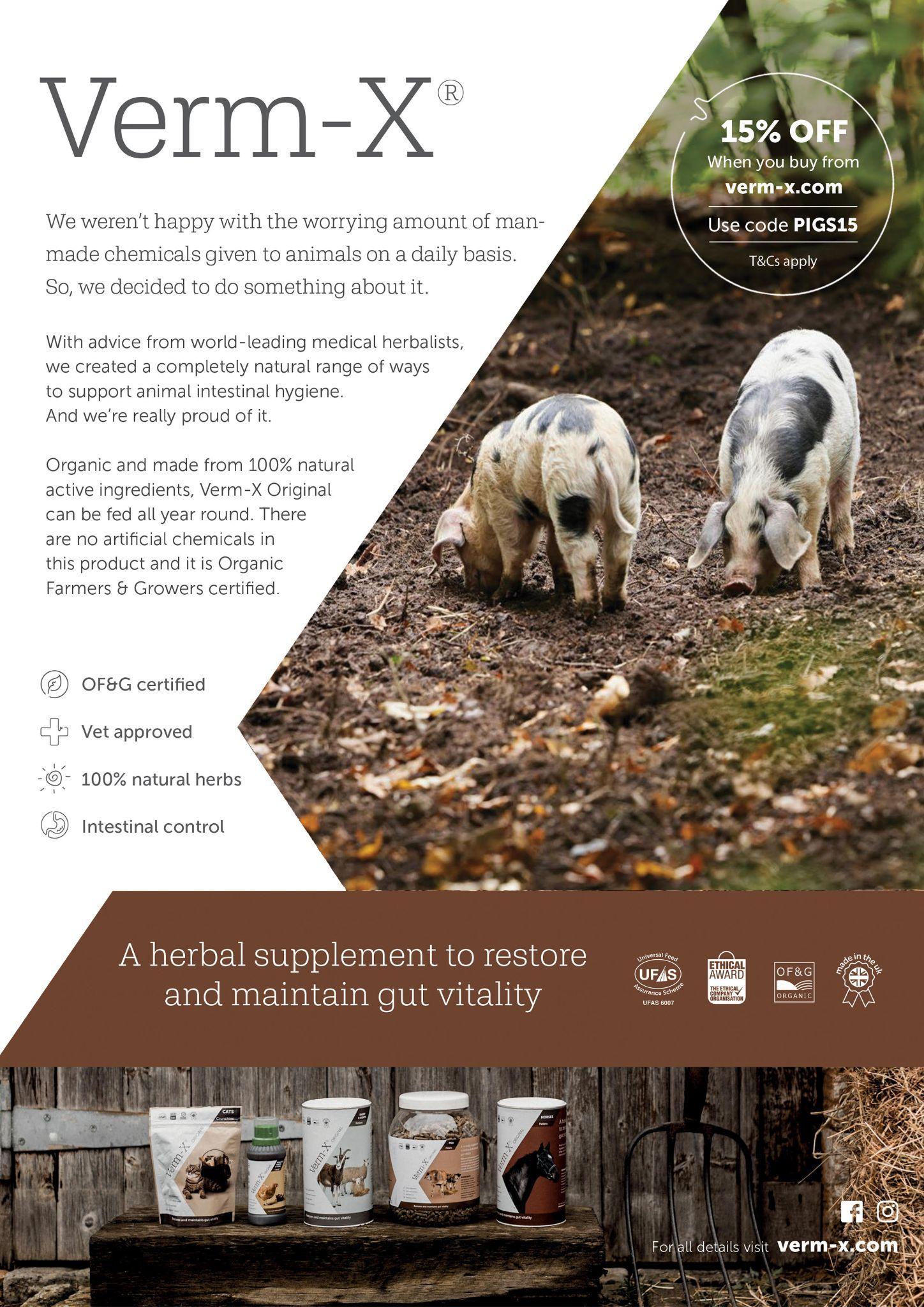
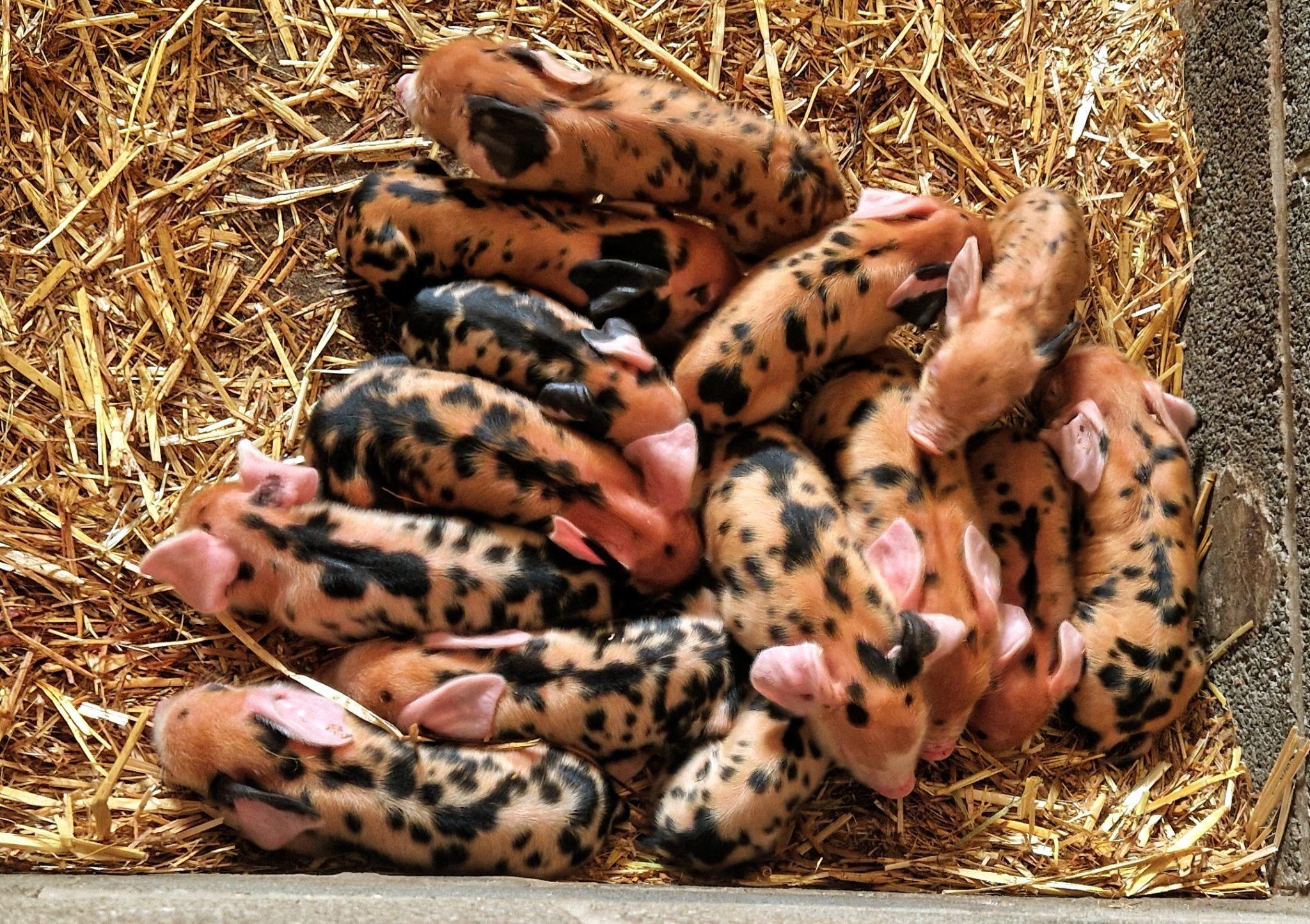


In This Issue
O’Shea 4 Lets Rootle 5 Celebrate with us 6 Upcoming Events & Replays 7 OSBPGAwards 2022 9 OSB Pig Carcass Report 10 Sustainable Pig Feed Launched 11 Quarterly Farrowing Update 13 OSBPGApp Update 14 17 Valuing Our OSB Pork Series Education: Our Pig Courses 18 OSBPG Haulier Service 19 Knowing Our Boars 21 Fundraising Update 22 OSB Pork Labels 23 Farming Through the Eyes of a Child 25 GSAReport 26 Vet Chat 28 Your Thoughts from Lydia Johnston 31 Your Recipe - Mango & Pork Kebabs 32 Significant Disease Charter 37 Join Us on Social Media
Photo by Kathleen
Lets Rootle - Happy Easter
Spring is finally here, hooray I hear you cheer. It feels like it's been a long winter, heavy rains causing significant mud problems for us in the pig pens, followed by freezing temperatures and snow where it struggled to get above freezing for a week or so at a time, making the endless chore of carting water to the pigs a somewhat thankless task. But, it's all part for course when breeding or keeping pigs, and I’m sure it won’t be long before we’re erecting pig shades and filling wallows to keep our stock nice and cool; the other end of the weather spectrum for us. We are now in the full swing of the farrowing season, and many non breeding pig keepers will be sourcing their weaners to stock their freezers, feed their family and friends.
The price of pig feed has stabilised after a great harvest in 2022, and the fuel prices slowly reducing, as a result some may have even noticed a decrease in their feed prices, which is a much welcomed change. If you’re looking to get a few weaners it's worth working out how much feed you’ll need and try and buy it in one hit,
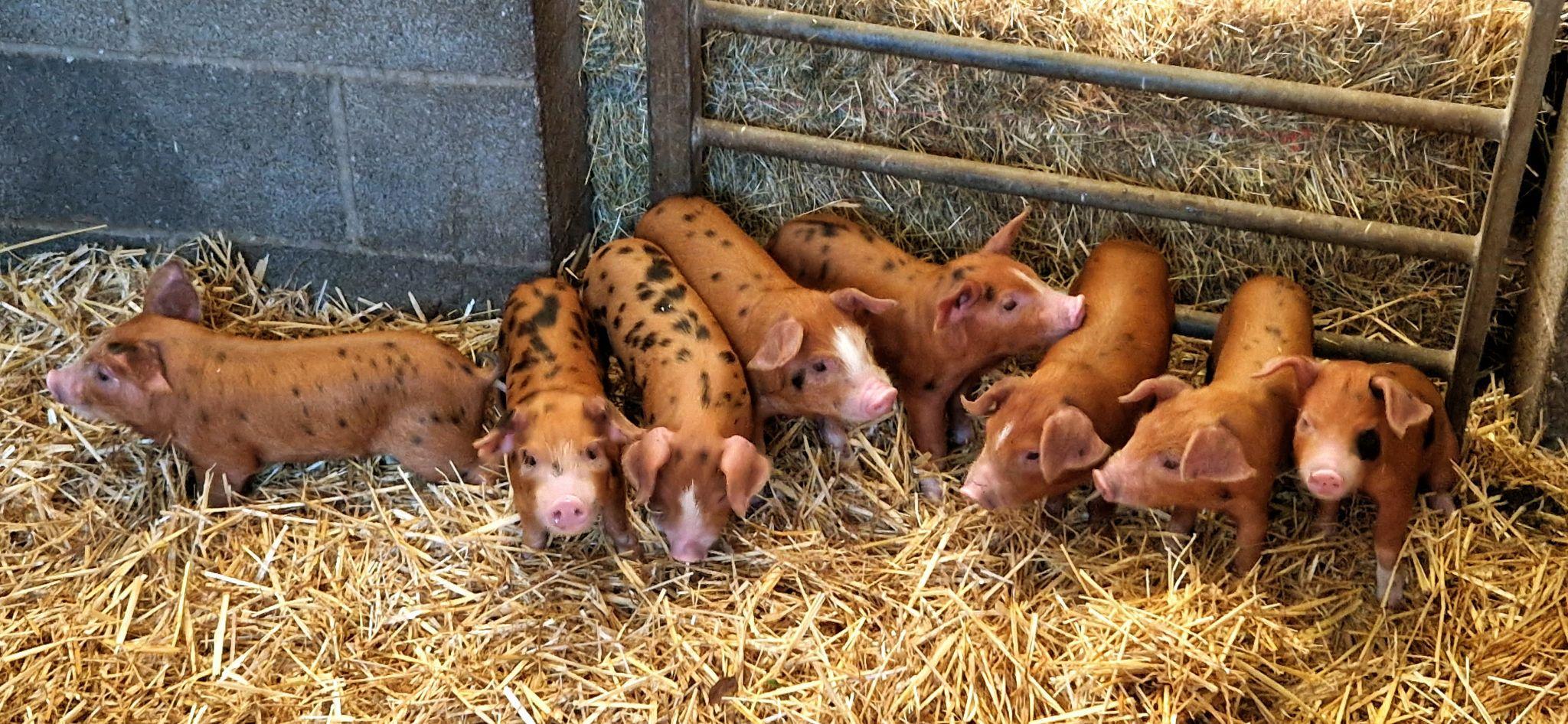
Assuming shelf life and storage is available to you.Aweaner from 8 weeks of age to slaughter at 7 months will consume about 300kg of concentrate (15 x 20kg bags), it maybe worth teaming up with another local pig breeder to buy a tonne at a time to bring
the costs down and share the feed. Buying 50 x 20Kg bags is normally £25-£30 cheaper (that’s 2-3 bags of feed) than buying as you need.
Use our pig feed calculator to help you. A free tool from our website here

Ensure your feed is nutritionally balanced for your pigs, cheaper feed will only delay finishing time and end up costing you more. Avoid cutting corners and remember its illegal to feed food/kitchen waste to your livestock, the risk of pathogens is significantly increased, andAfrican Swine Fever (ASF) is getting closer every day, it's not a question of if it arrives but when.
Most of all enjoy your pigs, they’re a great source of time wasting and great soother for mental health stress. Stay well and happy pig keeping, and remember we’re here to help you, so if you have a question, need some help or guidance please reach out to us and we will help you all we can.
HAPPY EASTER TO YOU ALL
CELEBRATE WITH US
After 10 years of beingThe Oxford Sandy and Black Pig Group, we proudly became the Oxford Sandy and Black Pig Group Foundation Charity on 20 July 2020. UK's first and only pig breed that is a registered charity.

Yes, we turn 3 years old in July and we hope that you can celebrate with us as we take a look back at what we have and continue to achieve together.
To help us celebrate , we will be offering free fundraiser packs full of goodies, inspirational ideas and support material to help you run a successful event. Whether you are hosting a farm open day, competing in an event, having a stall at a summer country show, doing a coffee morning, a BBQ, helping to organise a community or school event, cake with friends, cuddles with your pigs or even a charity fundraiser, we hope you will join us to take the opportunity in your community to raise the awareness of our beautiful Oxford Sandy and Black and all the joys they bring us and the great work we all do. We would love to celebrate with you, your friends, families and pigs virtually on the big day and it would be great if you could share your photos with the hashtag #OSBPGBirthdayCelebrations.
Keep an eye open on our social media platforms and our website for more details on how you can register for your free fundraising pack for your up-coming events.
Let’s have fun together sharing ideas and ways we can raise awareness of our great breed and our OSBPG Charity that is always here to support each and everyone one of you.
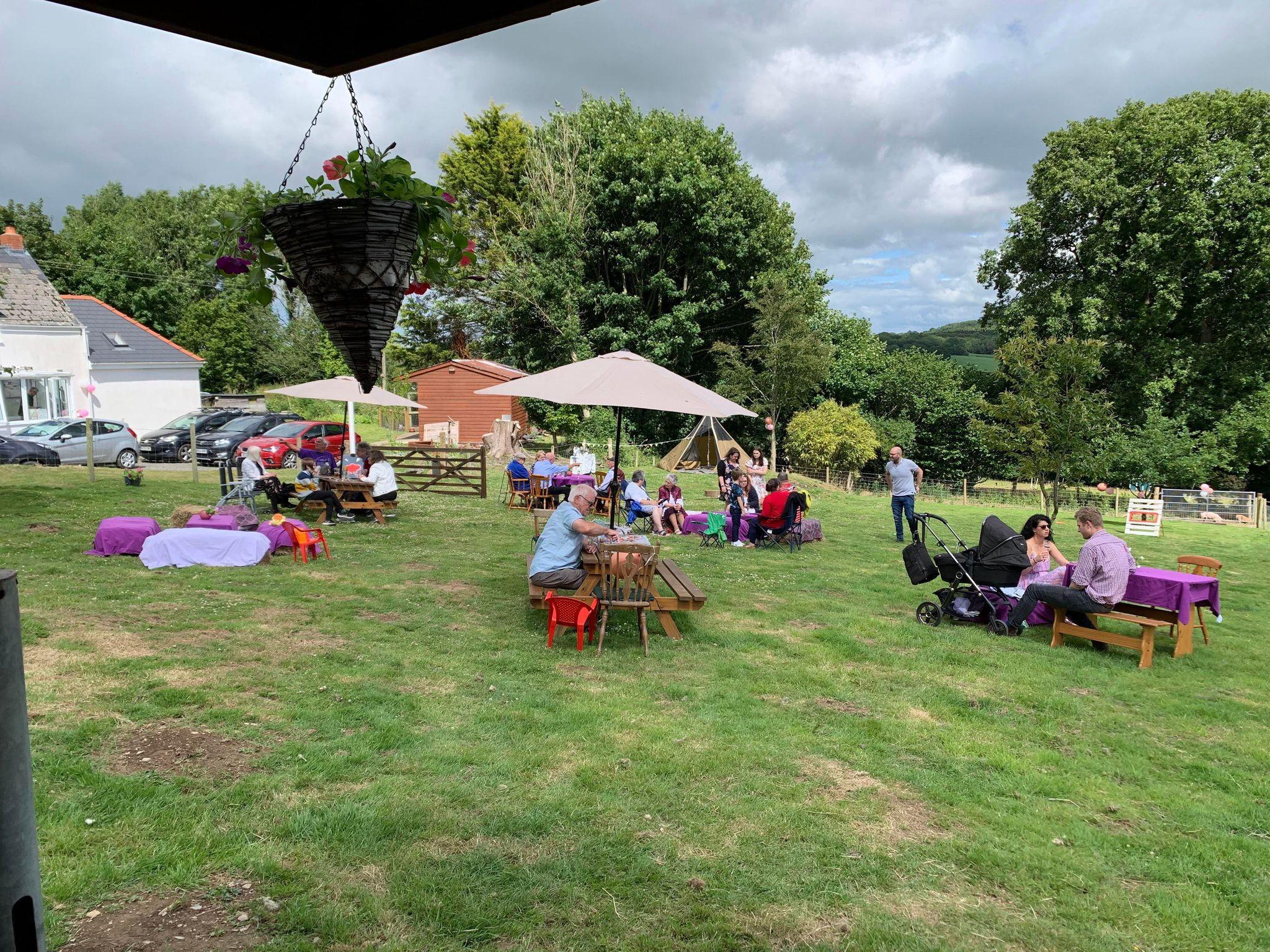
We can’t wait to see what you have planned.
As a charity we could not achieve as much as we have without you, our supporters, thank you.
To register your interest and your wonderful ideas of fun, email lisaberry316@hotmail.co.uk
Upcoming Events & Replays

Homemade NdujaOSB PorkSausage
Tune in for a 1 minute YouTube short clip fromAndrewO’Sheaas heshowsushiswayof making Nduja, a spicy cured pork sausage from thesouthernItaly provinceofCalabrian
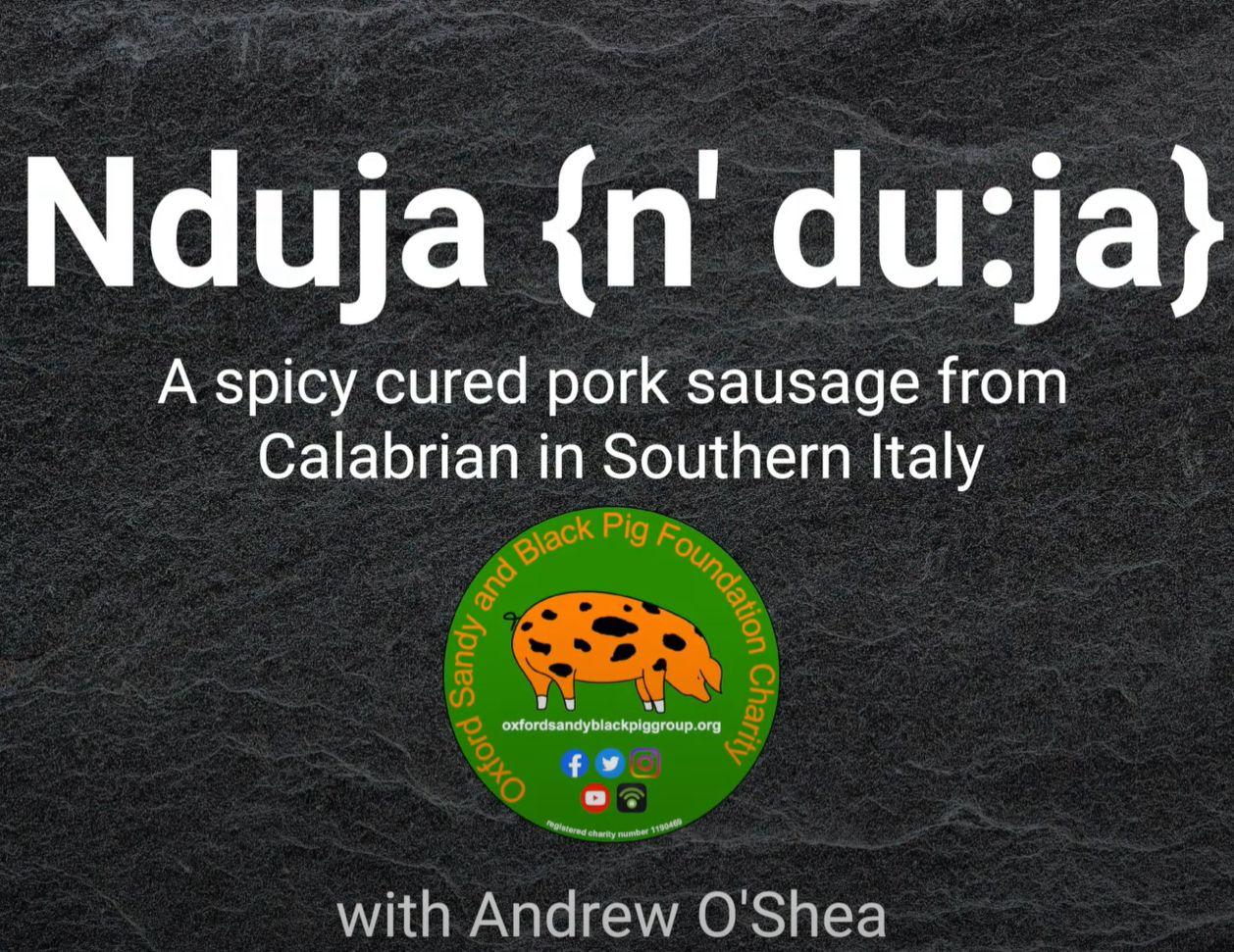
SocialNightis YourNightAskUsAnything


Join us for a social evening on Thursday April20that19:30hrs. Wewillhaveachatand discuss what is going ononourholdingsand more. You will also havetheopportunityto askusanything.
PodcastRyecroft RareBreeds
Tune in as Andrew O'SheainterviewsMike and Jayne Carter (2022 OSBPG Pork Producer Award Winners) of Ryecroft Rare Breeds abouttheirjourneyinto setting up their own butchery to support their business and provide a service to localmeatproducers.



ClicktoView
Clicktolisten
ClicktoRegister
OSBPGAwards 2022
The 2022 Oxford Sandy and Black Foundation Awards celebrated the excellence and achievements of individuals who have made an impact on the OSB breed. With over 50 nominees and hundreds of votes from the OSBPG Charity supporters, the competition was fierce.


The first award presented was the Pig Excellence Award, which recognises individuals who have made significant contributions to the OSB breed in terms of high welfare, good husbandry and sustainable farming. The nominees were;
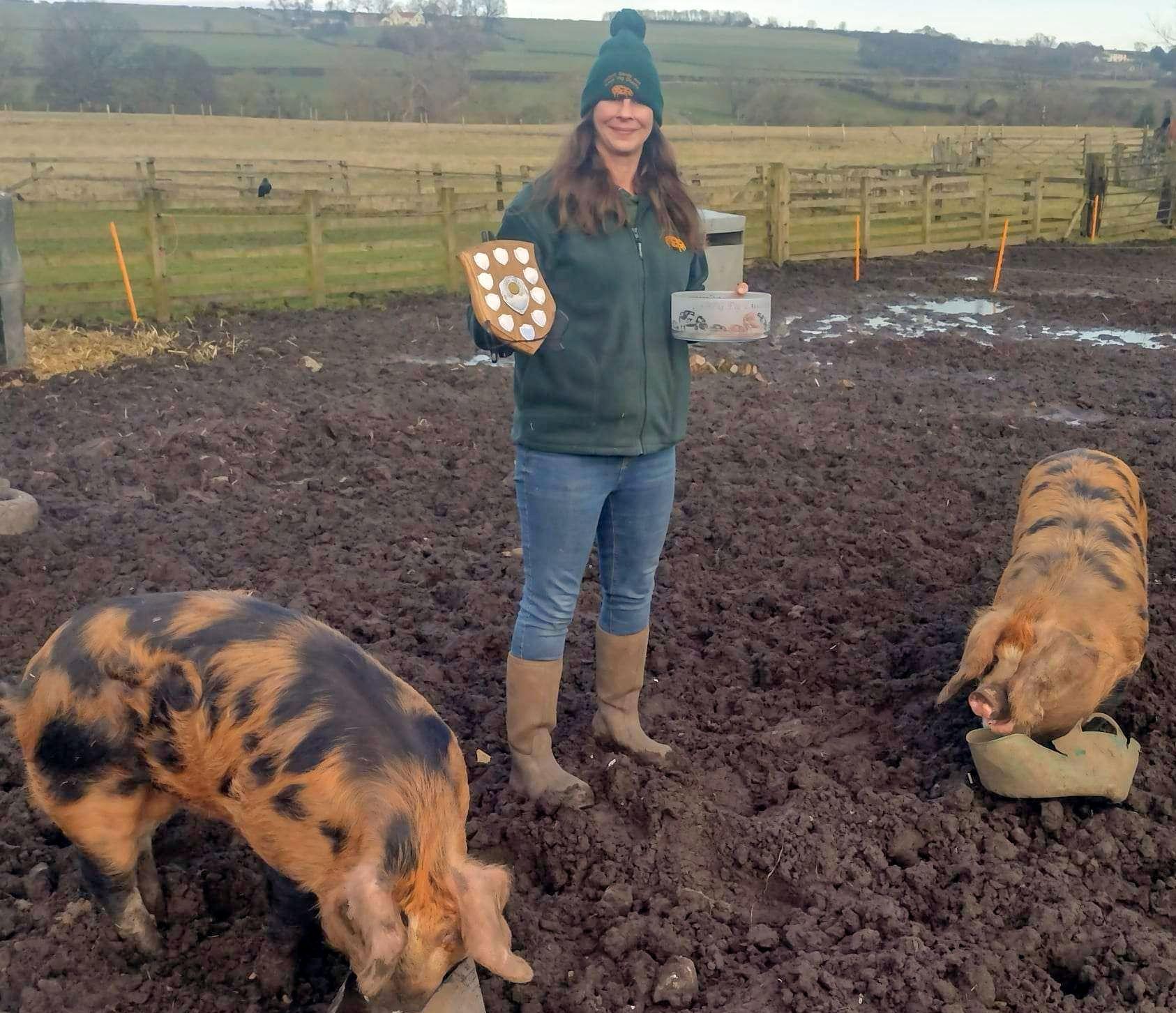
Mary Benfield (Piggin Good Pork), Lisa Corcoran (Engineman’s Smallholding), Anita Withers (Clifton Lodge Smallholding), Mike & Jayne Carter (Ryecroft Rare Breeds), Lydia Johnston (Cownwy Valley Produce), Fiona & Tristan Maclennan, Amanda Packford-Garrett, Helen Ellaway, Scrubditch Care Farm (Emma Costley-White & Gerry Fouracres), Kerrie Chalmers, Louise Blenkhorn, Bob Pratley, Clive Allcorn &Angela Pratt, Justin & Donna Newman (Happy Wallow), Lorraine Jones, Eve Atkins, Aimee & Stephen Edmond (Poppyfields Fine Produce), Kathryn & Martin Smith, Lucy Ball and Heber Hargreaves
The winner of this prestigious award was Lisa Corcoran, who stood out for her dedication and exceptional work in promoting the breed.
Lisa Corcoran - PIg ExcellenceAward Winner 2022
Lisa's passion for the OSB breed was evident in the dedication and hard work her good husbandry and high welfare standards was highly recognised from voters. Her commitment to preserving the breed's unique characteristics and improving its quality was inspiring. Lisa's expertise and knowledge of the breed were also noted by the judges, who were impressed by her innovative and effective breeding methods.
Overall, Lisa Corcoran's contribution to the OSB breed was recognized as exceptional by the judges and supporters alike. Her win was a testament to the importance of preserving and improving heritage breeds, and her achievement will undoubtedly inspire others to follow in her footsteps.
In addition to the Pig Excellence Award, the Oxford Sandy and Black Foundation Awards also included the Pork Producer of the Year Award. This award recognises individuals or businesses who have demonstrated exceptional skill and dedication in producing high-quality OSB pork.

The winner of the Pork Producer of the Year Award in 2022 was Ryecroft Rare BreedsMike and Jayne Carter and their children Lucy and Ben. This family-run business has not only raised some of the finest OSB pigs but also witnessed them set up their own butchery, where they support their local community and sell their delicious pork directly to customers.
Ryecroft Rare Breeds' commitment to the OSB breed and their unique approach to butchery was recognised as exceptional by the judges. Their dedication to producing high-quality pork has resulted in a growing fan base, and their butchery service has also supported other local producers in the area.
Overall, Ryecroft Rare Breeds' innovative approach to pork production and butchery was applauded by the judges and supporters alike.
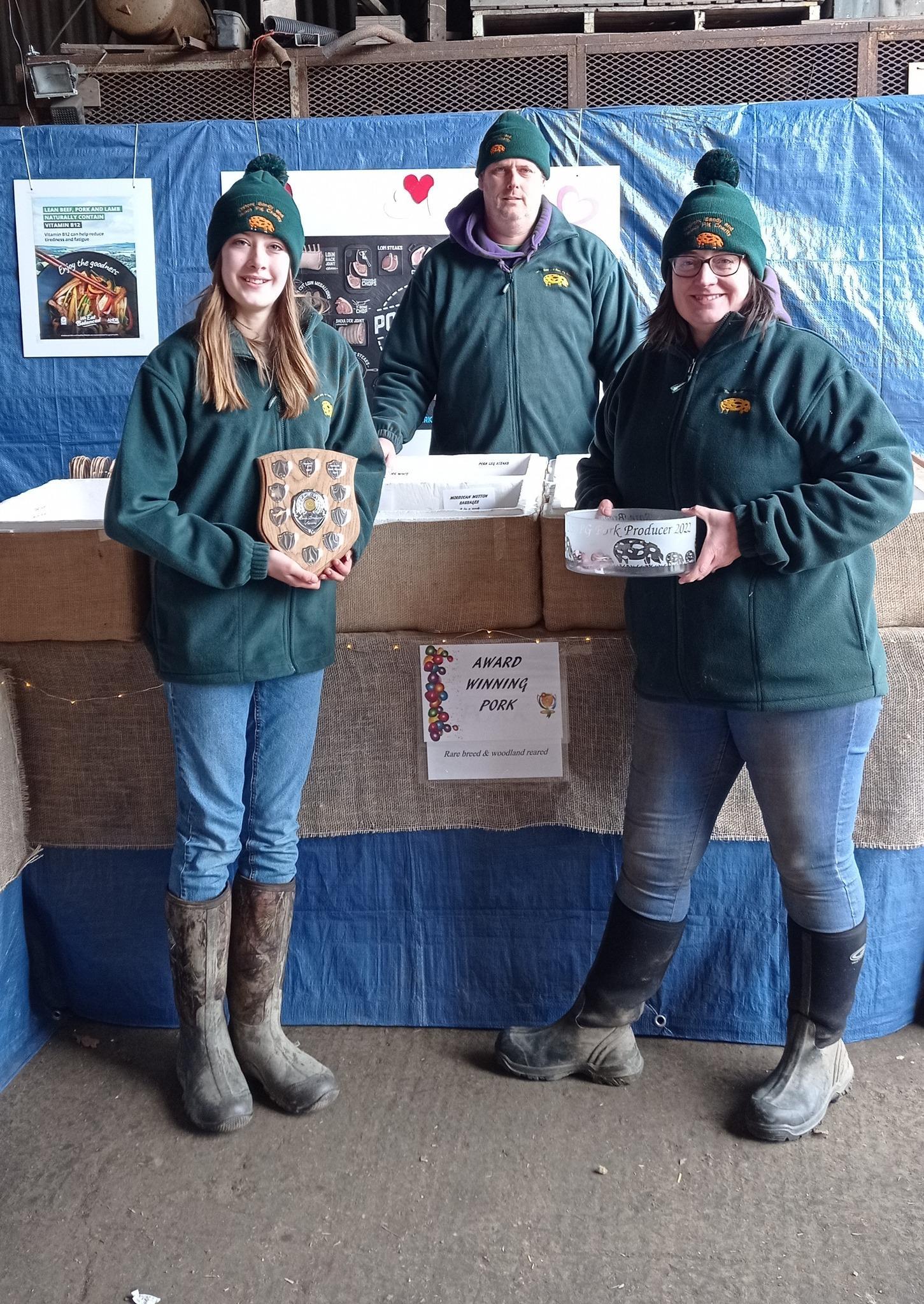
Their win was a testament to the importance of supporting small-scale producers who prioritise animal welfare and sustainable farming practices. Their achievement will undoubtedly inspire others to explore similar avenues in their pursuit of producing high-quality pork while supporting their local communities.
The charity would like to extend its heartfelt thanks to everyone who participated in the 2022 Awards. With over 50 nominees and hundreds of votes cast by our wonderful supporters, this year's competition was a resounding success. We are especially grateful to Lisa Corcoran and Ryecroft Rare Breeds for their exceptional contributions to the OSB breed, and for setting the bar high for future nominees. We hope that their achievements will inspire others to continue working towards preserving and improving heritage breeds like the OSB. Once again, thank you to everyone who supports us and our mission to promote the conservation and welfare of the Oxford Sandy and Black pig and its pork.
Ryecroft Rare Breeds - Pork Producer Award Winner 2022
OSB Pig Carcass Statistics
This dataset (collected over that last 14 months) provides information on the average carcass weights of male (boars) and female (gilts) pigs between 5.5 and 10 months of age. In total we have 140 records. Whilst concentration is on finishing stock it is worth noting that our producers have processed sows and breeding boars which although not popular there is a slight increase being observed.

The data is ongoing and is indicative of the popularity of OSB Pork and the popular cuts that are being provided through our independent producers who are supporting their local communities. The trend to purchase local and support local is becoming increasingly popular. Please continue to send in you dead weights and produce from your carcass.
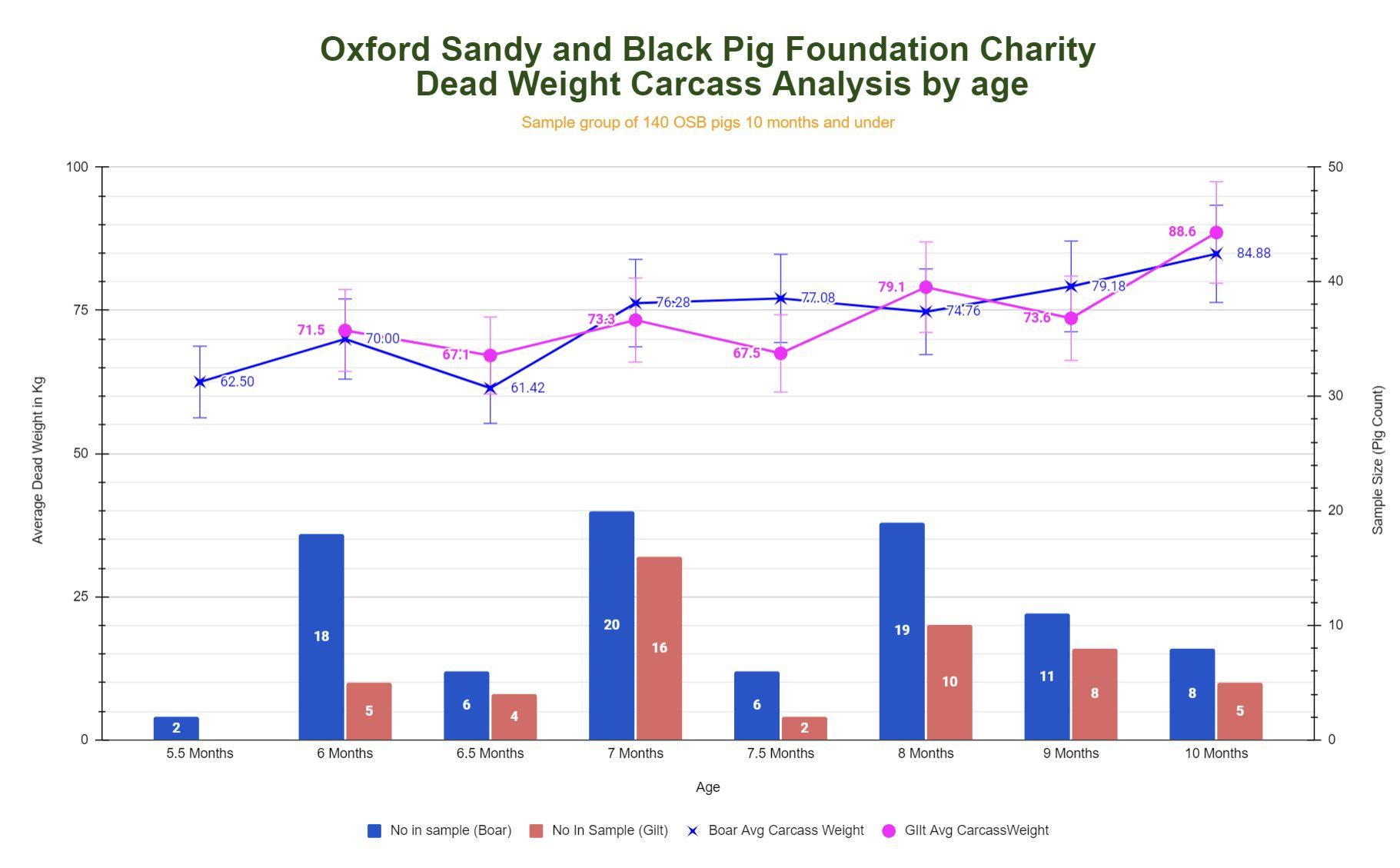
Popular pork cuts have been OSB pork belly joints and as we approach Summer we will find sausages and OSB Pork burgers becoming popular. Charcuterie from the OSB Pork has greatly impacted the Charcuterie sector and is proving that the Oxford Sandy and Black is truly a versatile pig.
We also performed a hypothesis test to determine if there was a significant difference in the mean carcass weight between boars and gilts. We used a two-sample t-test for independent samples and found that there was no significant difference in the mean carcass weight between the two sexes. What was evident that intact boars were quicker to meet and exceed target weights whereas gilts proved to be slightly slower at meeting target weight which is common being a rare breed.
The graph above shows the relationships between the two variables and provide insights into the data. The plots show that carcass weight generally increases with age for both boars and gilts. However, there is some variability in the data, which is reflected in the scatter of the points around the trendline.
It also reveals differences in the spread and density of the data between the two sexes. For example, at 7 months of age, the boar carcass weights are more spread out than the gilt carcass weights, indicating greater variability in the boar data.
In summary, the data so far provides valuable information on the average carcass weights of pigs at different ages. The graph provides a visual representation of the data and reveals some interesting patterns and differences between the two sexes.
SUSTAINABLE PIG FEED - Launched
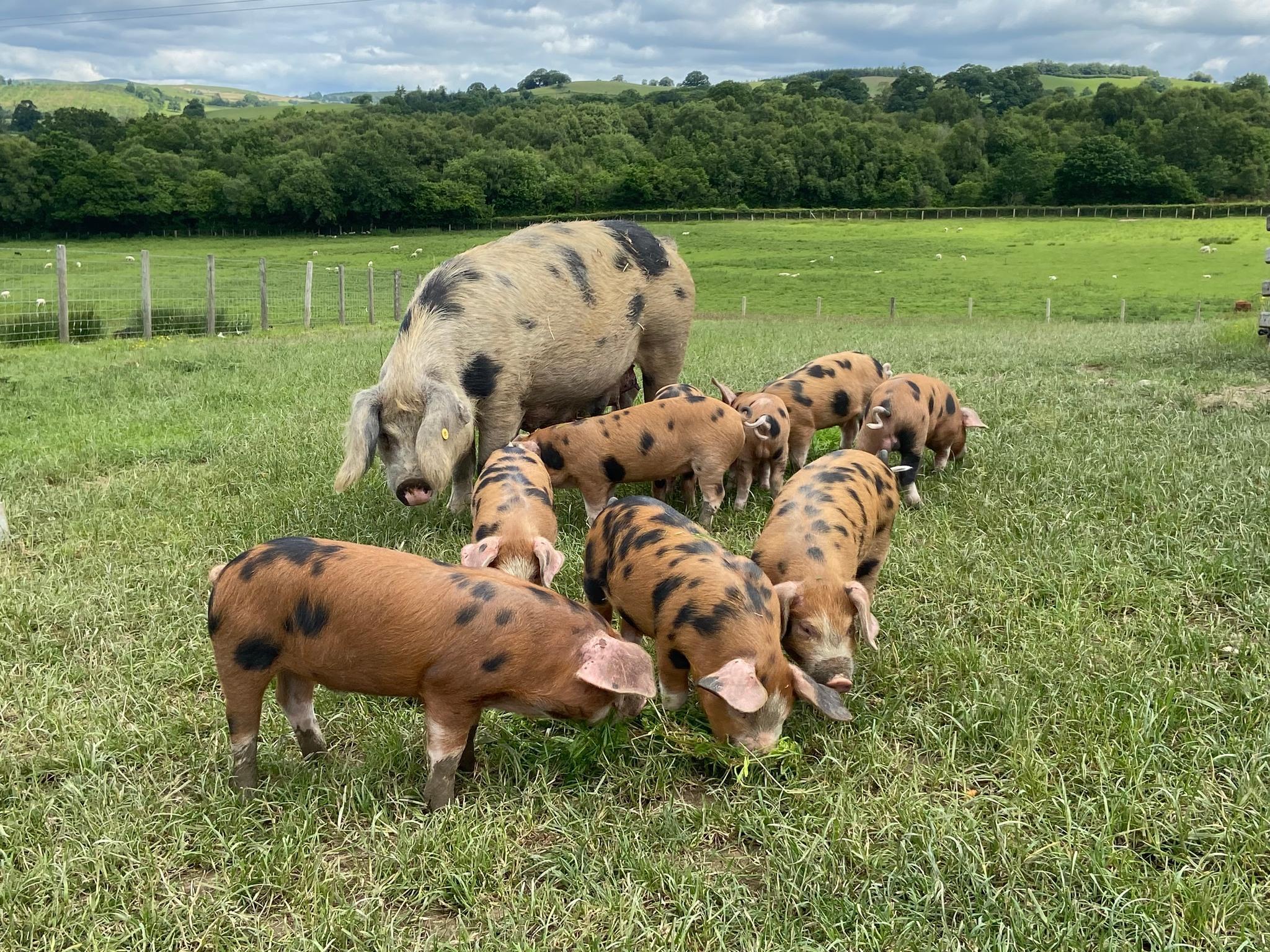
Now released and being produced. The feed is now being trialled with the first mill in the South West, with whomApheya have existing business relations, Harpers Feed in Holsworthy.
Victoria Phillips - leading pig nutritionist - of Apheya Animal Nutrition has formulated the feed specifically for our breed type taking into consideration all the nutritional aspect for rare and traditional pig breeds.
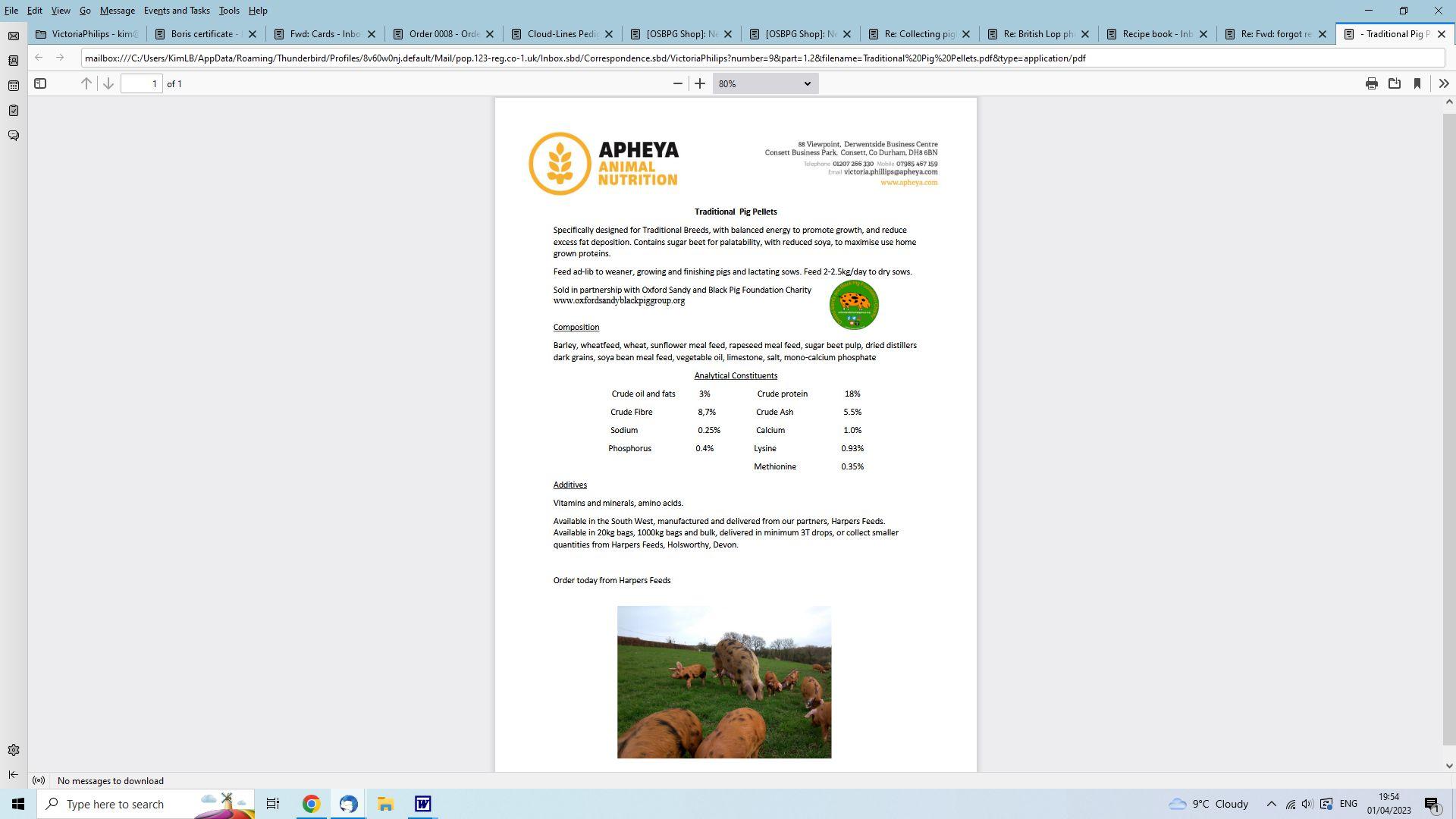
Nutrition, essential amino acids and protein are the main processes for good muscle, tissue and bone growth in our
Fortunately grain has come down and is reflected in the price, however peas and beans are still high and difficult to obtain.
Harpers produce 20kg bags and as the feed will be made specially to order production will go ahead on 3 tonnes and above as it would not be cost effective to make the feed for say 100kg. Going forward, there is nothing to say that pre-orders may be taken whereby Harpers may store ready for pick up but this will have to be discussed. Delivery is also an option.
The feed is not cheap nor is it expensive but, as mentioned in our last issue, is indicative to the requirements that necessitates healthy growth and sustenance to our pigs in all stages of their growing life. It will be in pellet form sized at 5.5mm and come in 20kg bags, with a minimum shelf life of 3 months which is standard. Priced at GBP10.90 per bag.
Payment structure will be at end of month of delivery, as you would have currently with your local farm store. For the first orders please would you contact the charity via the email below. Thereafter it will be direct to Harpers.

The process and feed formulation has been very carefully put together, sourcing mills up and down the country to produce the feed has been positive. Apheya are using Harpers Feed to do the first pilot run so we can identify any adjustments to the mechanics of the logistics and put right before adding other participant mills.
For further information please email feed@osbpg.org
Listen to Victoria on feed and nutrition here
OSBPG Farrowing Update
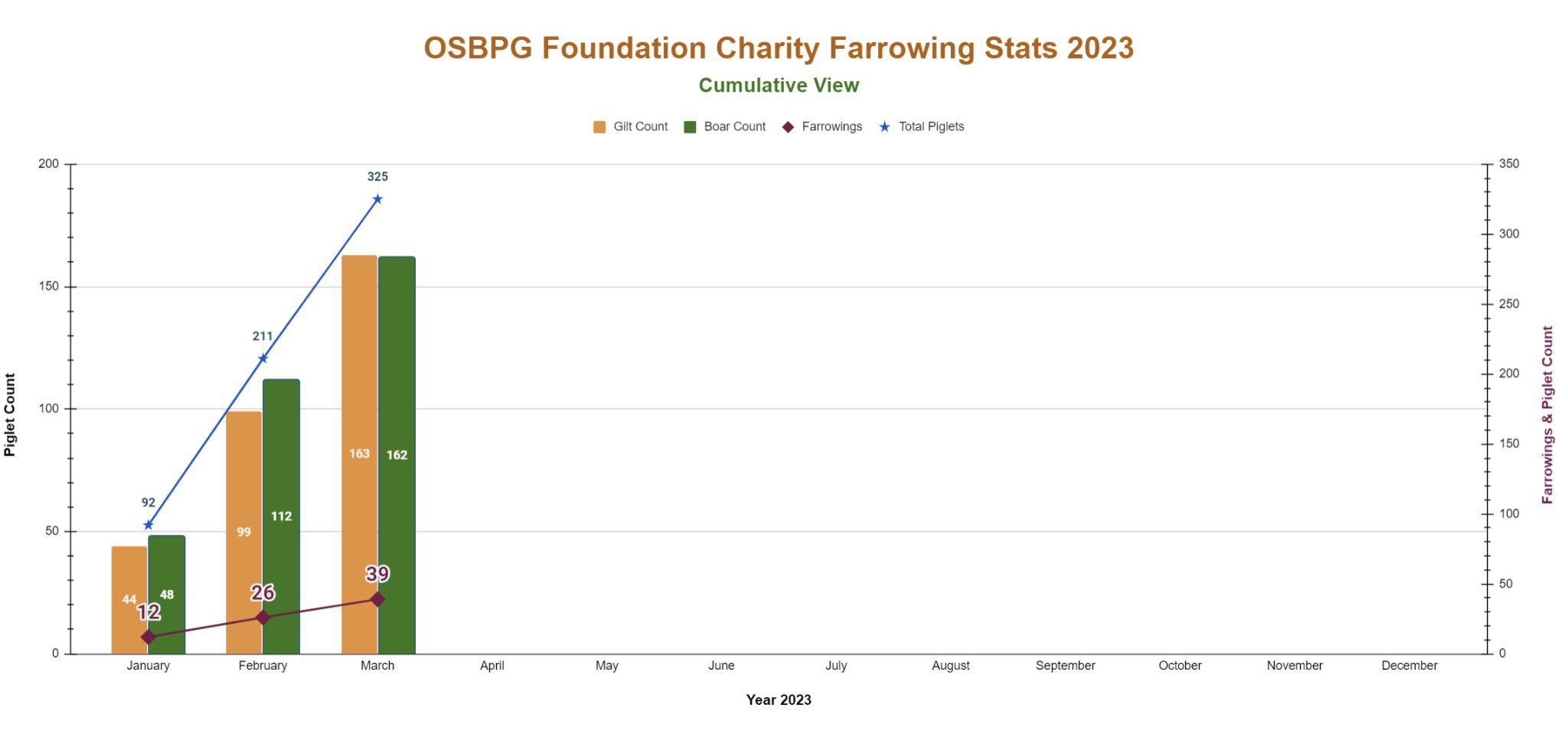
In 2023, our farrowing and litter sizes initially started slow in comparison to previous years. However, we are pleased to report that our breeders have performed exceptionally well with farrowing in February and March, resulting in a 6% increase compared to the previous year. Upon reviewing the boars utilised, Alexander typically dominates in terms of popularity, with Clarence trailing behind. However, as we begin breeding in 2023, we have observed a positive shift in this trend, with numerous farrowings attributed to the Clarence lines.
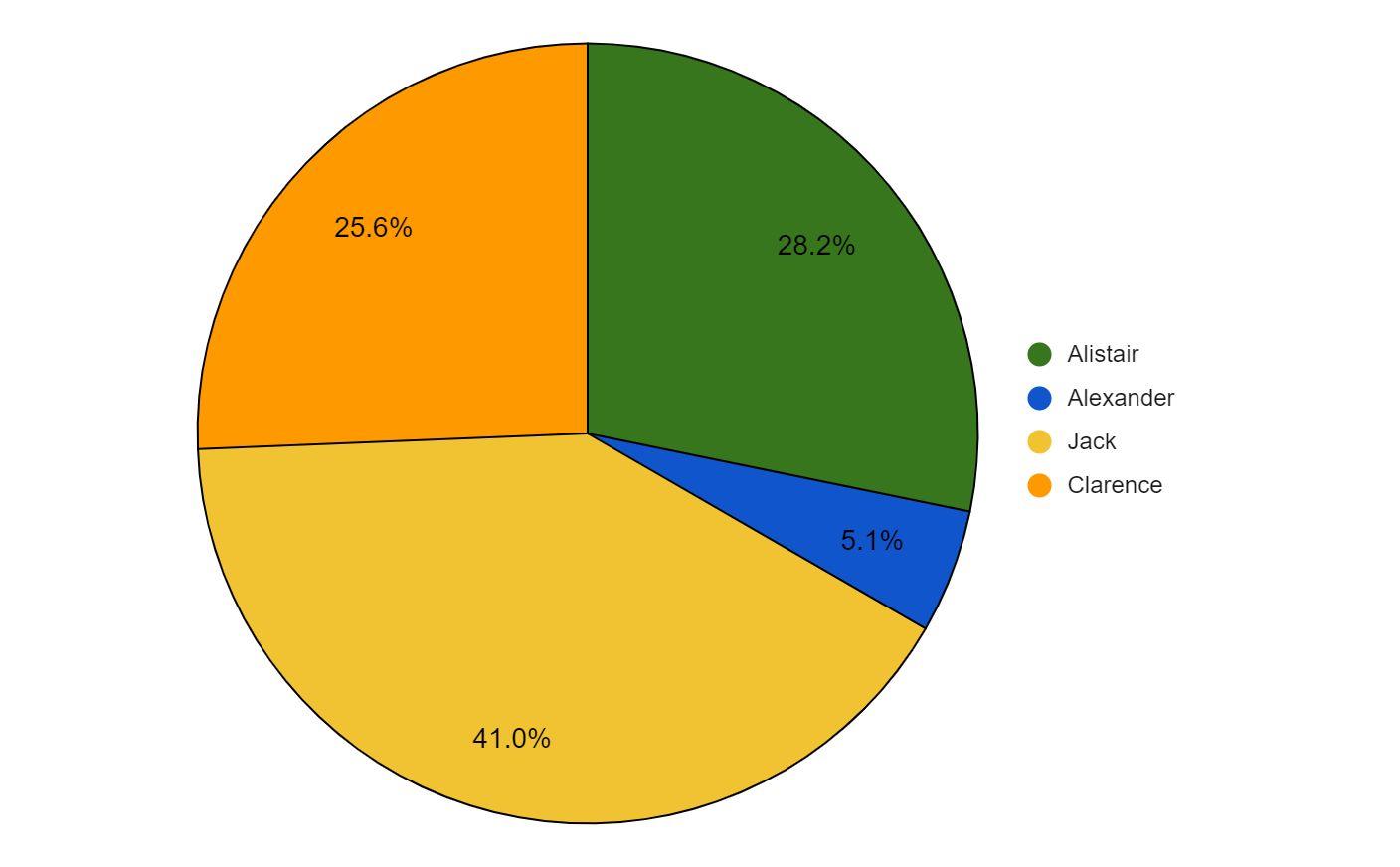

When considering the female bloodlines, we are proud to announce that we have achieved recorded farrowings from every bloodline at an unprecedented early stage in the year.This remarkable accomplishment is a testament to the hard work and dedication of our breeders. We also attribute this success to the positive impact of our Genetic SpreadAllowance program. Over one-third of the recorded data stem from lines that our charity has supported in 2022 by distributing much-needed bloodlines across the UK.

OSBPG Farrowing Update (continued)
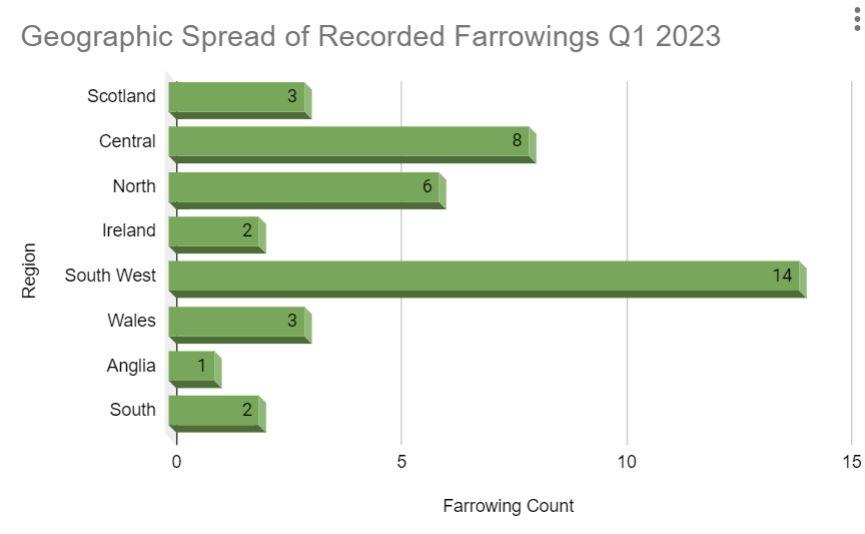
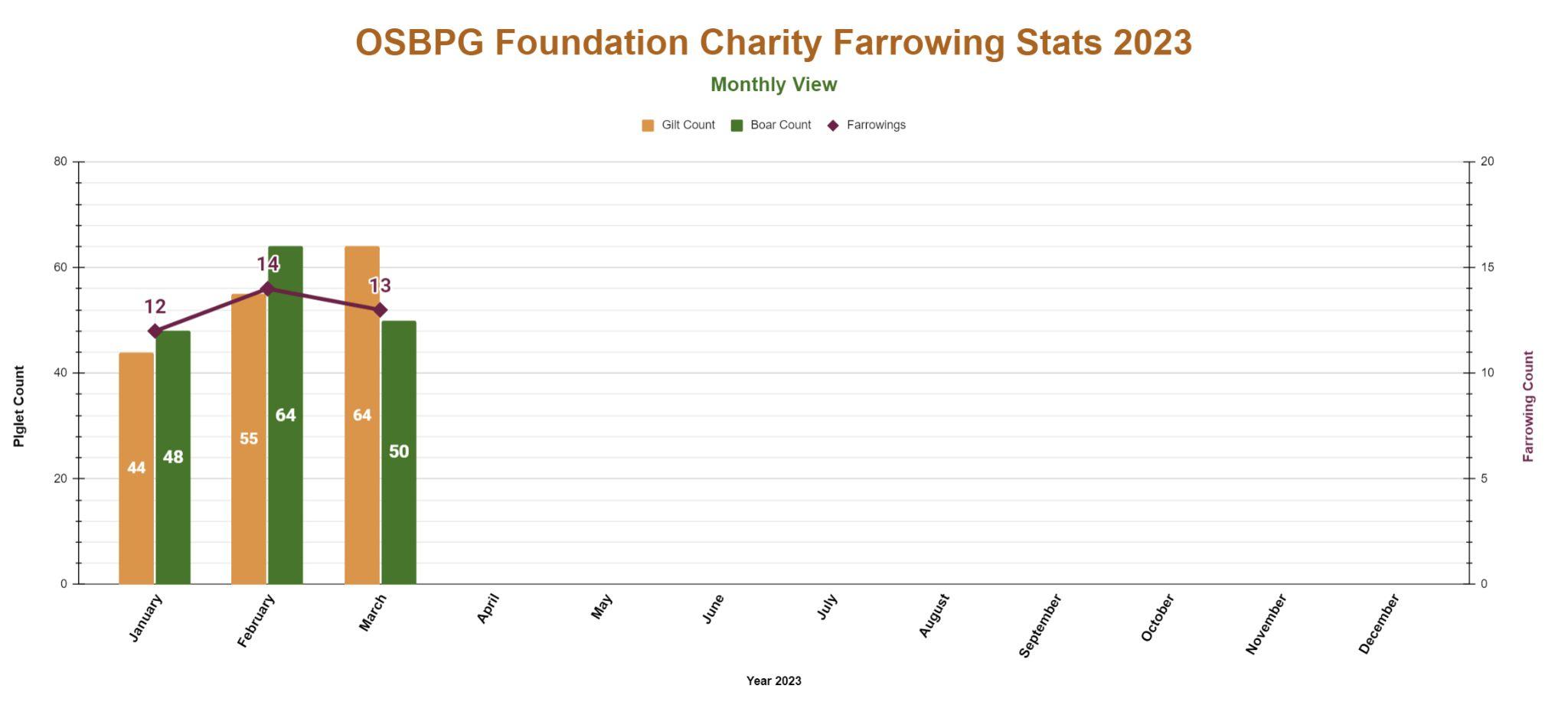
In conclusion, we are pleased to report that despite a slow start, 2023 has proven to start the year for our breeding program, with a notable increase in farrowing and litter sizes.The shift in popularity towards the Clarence lines and our achievement of recorded farrowings from every female bloodline are particularly noteworthy achievements that we attribute to the tireless efforts of our breeders and the benefits of our Genetic SpreadAllowance program.

Oxford Sandy and Black Pig Foundation Charity - Official
App
The FREE application from the Oxford Sandy and Black Pig Foundation Charity #1190469. www.oxfordsandyblackpiggroup.org
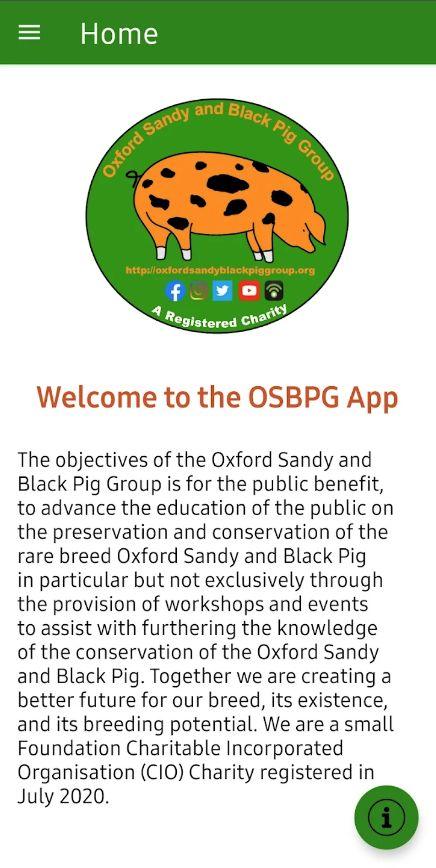
Our app gives you access to all our key info and tools whilst you're on the move.Tools such as:

- Pig WeightTool


- Farrowing DateTool
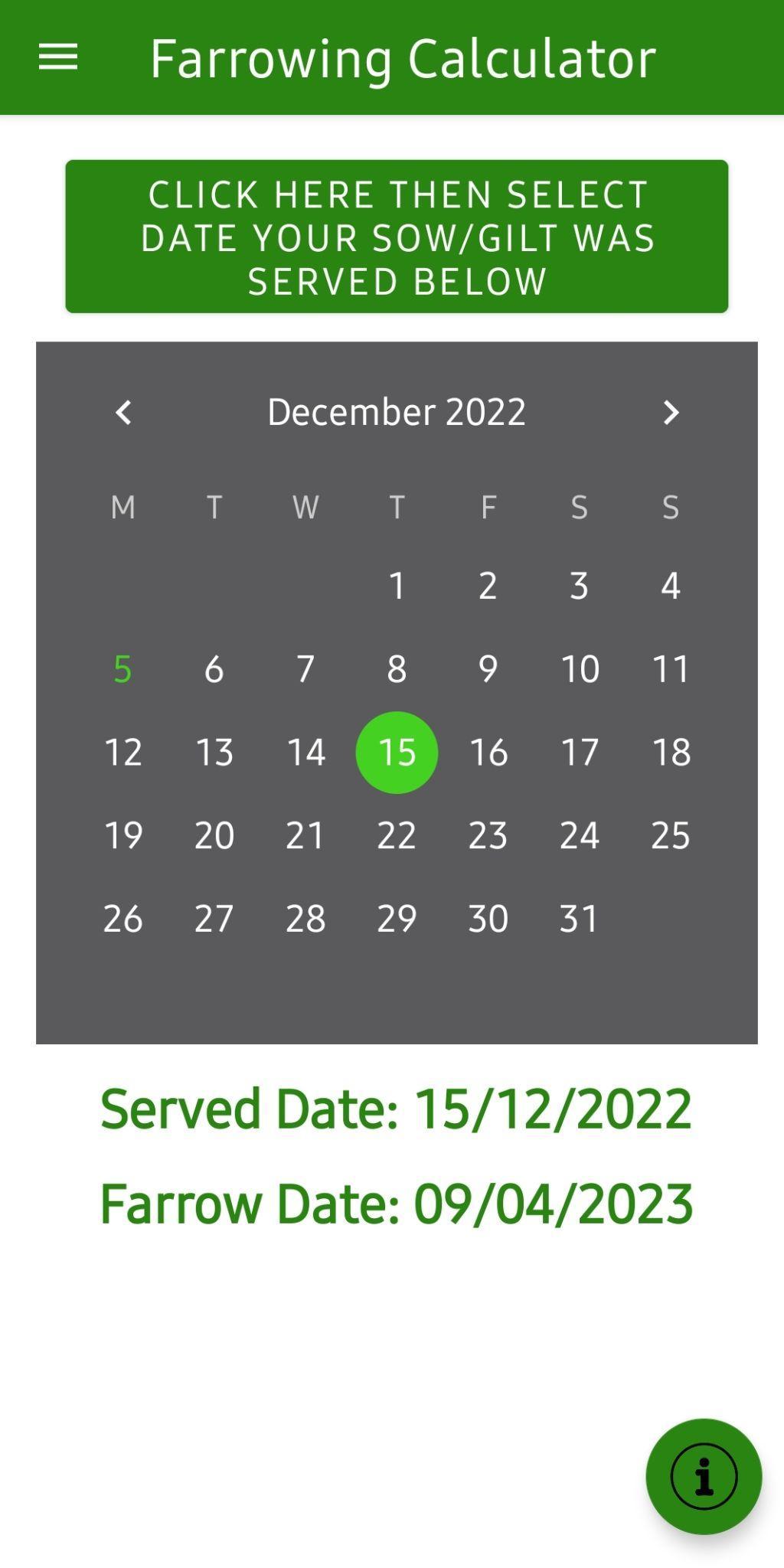

-Access to our Breeders Map

- GSAProgram
- and loads more
availableUpdatenow withnewtoolsto helpyou
Meating our Pork Producers
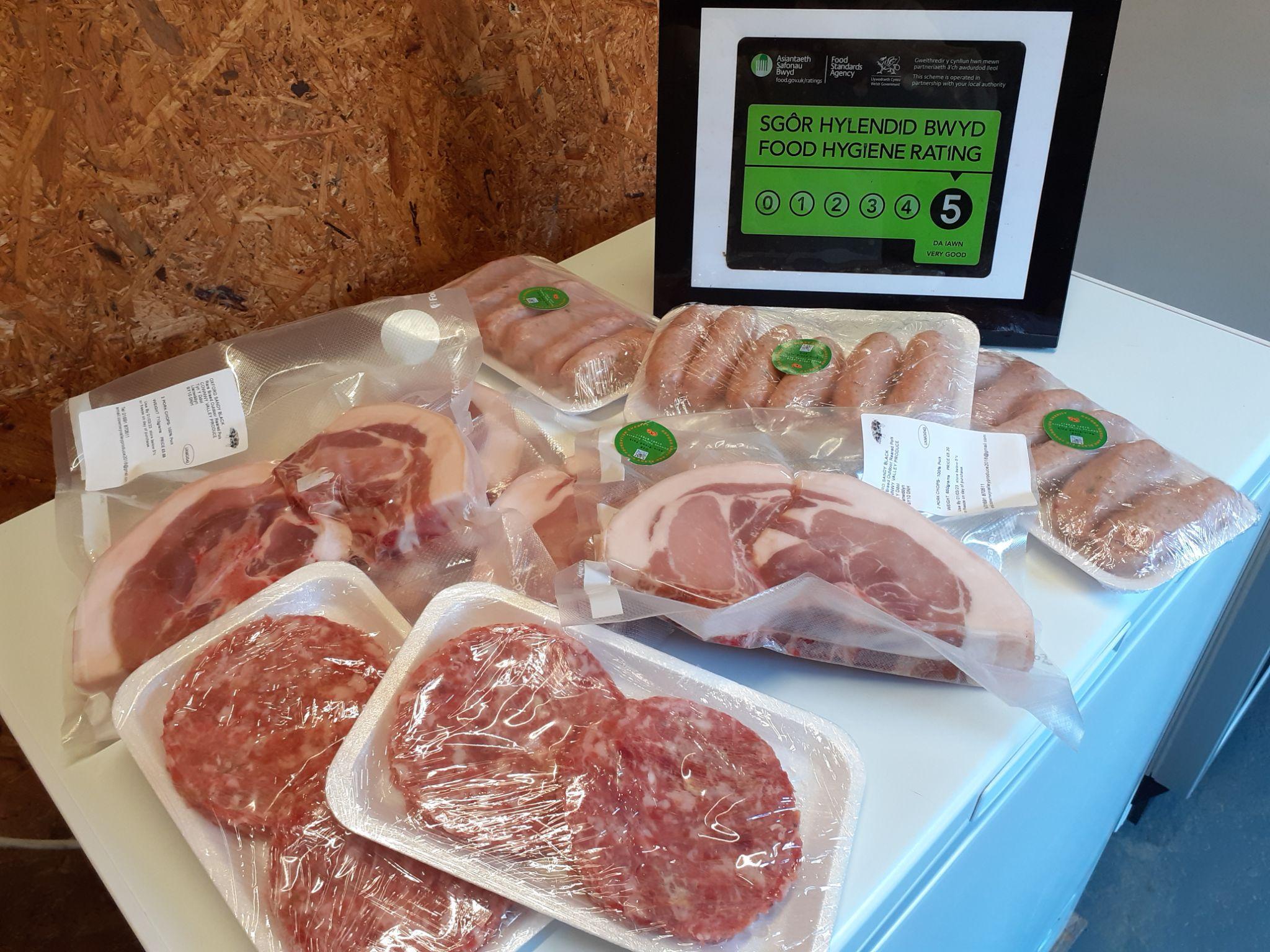
Cownwy Valley Produce was set up by us ( Lydia and Fred ) in October 2017 on the banks of the River Vyrnwy and Cownwy. We moved to this area to rear pigs (after looking at various properties and areas for 18 months). Neither of us had any farming background but we shared a passion for pigs and decided to take the plunge into pig rearing or never talk about it again. Now we talk about little else other than pigs and pork.
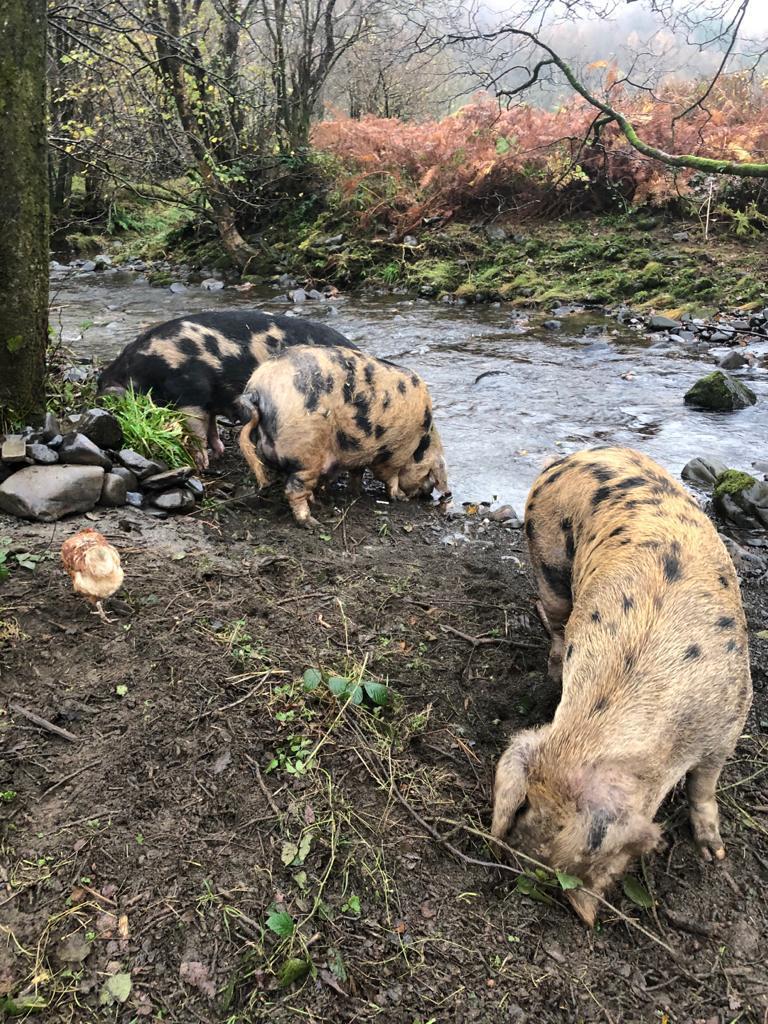

Our land is bordered on two sides by rivers, from which we have the fishing rights and can draw fresh water if needed, for the pigs. We purposely wanted a house with the land adjoining the property.This was one large empty field (approx. three acres) and my partner and I built all the paddocks, arks, fencing etc ourselves. With it being a stoney ground that was not easy. We tried the traditional arks with the curved roof to start with but quickly realised they are very small, expensive, difficult to get into - to clean. Therefore, we decided to build to our own specifications, higher to make it easier to get into and most of the arks have a covered food station attached to them. This shelters the pigs from the rain/snow and anything else Wales throws at us throughout the year.
We keep our pigs outdoors all year round giving them the freedom to root the ground in their paddocks. We have 12 paddocks which are rotated regularly to encourage re-growth.As we live in a wet area of Wales we built some concrete animal shelters (which we call “the Bays”) an indoor and outdoor shelter which can be used for farrowing, isolation, slaughter pigs and separating weaners from the sow.
The Bays and sty have come in very handy throughout the years, especially when there is a weather warning, somewhere safe and dry for the pigs to be. Each Bay can hold 2 breeding pigs or a pen of 5 growers quite easily for a few days.An old Sty came with the house, which we use for farrowing and this has an indoor and outdoor area.
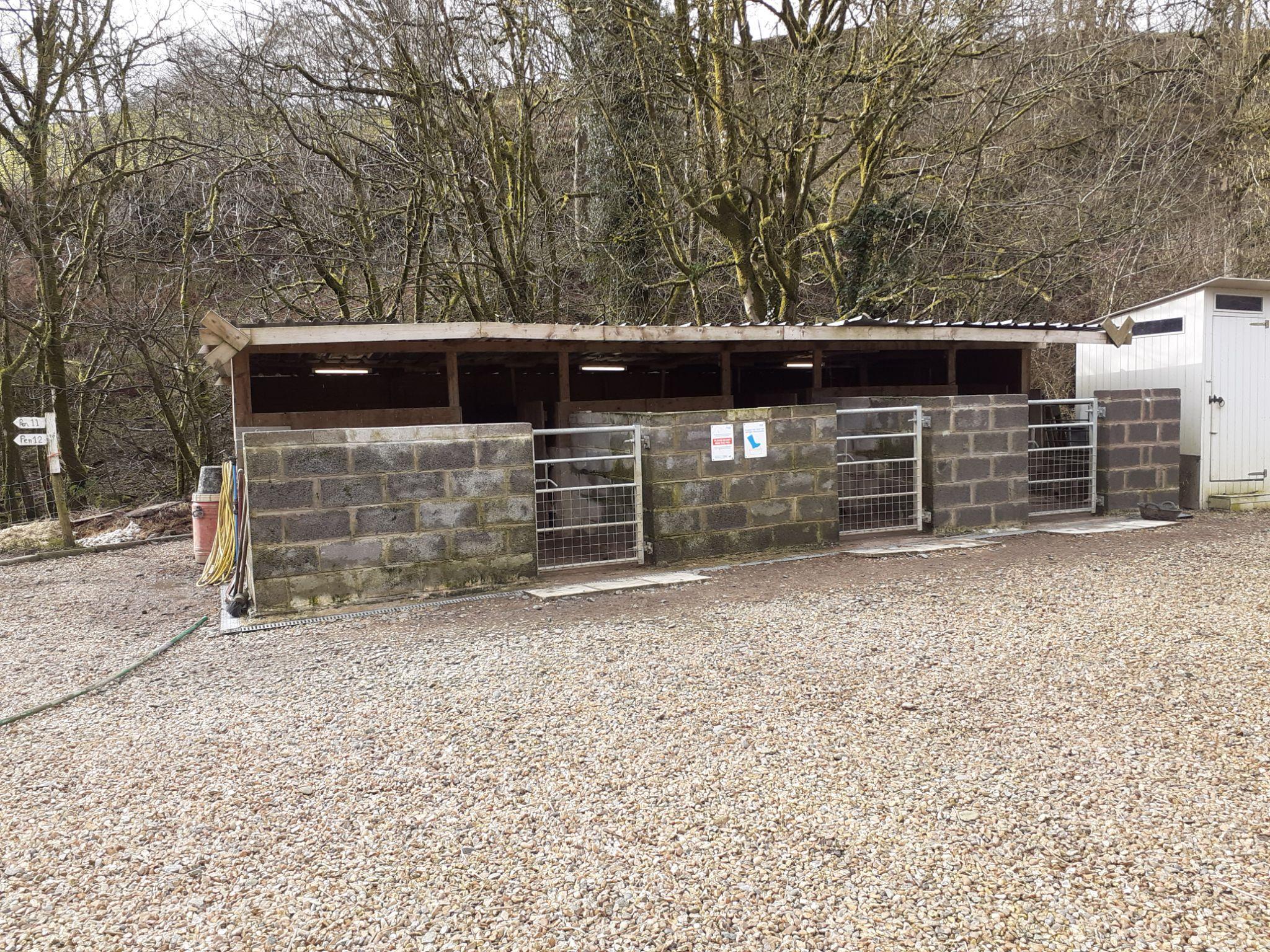
Valuing OSB Porkdoing what we do best
Lydia Johnston - Cownwy Valley Produce
Currently we have one OSB breeding boar named Boris an Alexander bloodline, and three breeding OSB sows, Iris, Mary and Elsie bloodlines They are all between 3 and 5 years old. Our 4th breeding sow is a Tamworth, which we rescued some years ago from appearing at the abattoir and we also use our OSB boar with her to give us meat pigs (mainly for the butcher). Most of the pigs from the litters we rear are kept by us to supply customers with pork throughout the year.Afew get sold as weaners or for future breeding stock. A local butcher uses our pork too and she usually buys 2/3 carcasses a month from us (as and when we have surplus).
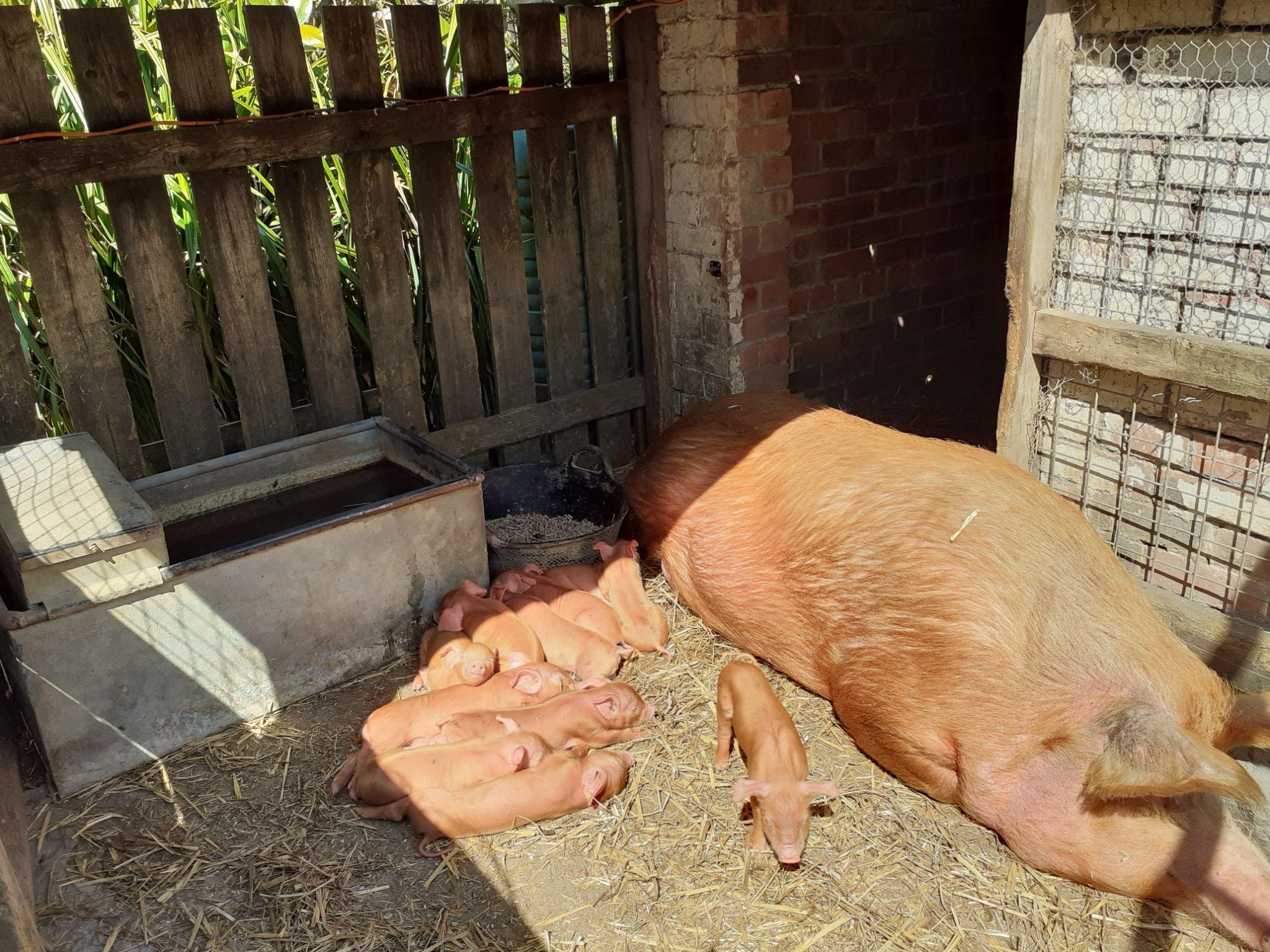
When we started, we sold whole carcasses to restaurants, hotels, and butchers, this was 95% of our sales, only 5% was direct to customer sales. However once Covid happened the restaurant and hotel business disappeared. We had to quickly find a new market for our pork. We started to use social media and do home deliveries locally. Now 95% is direct to the customer sales, from our farm gate, deliveries, and a local pop-up stall. The pop-up stall in the next village where they organise a monthly


coffee morning to raise money
for good causes, we are in the garden of the community centre during this time. We had a lot of orders for home delivery in this village during lockdown and rather than doing several deliveries monthly we now have one morning where they come to our stall, it is lovely to be able to talk to our customers, rather than just doing a drop off at the door.
We have several Holiday Parks nearby too and via Facebook and dropping of leaflets we have a good spring – summer trade from them.At Christmas time we advertise a choice of 2 Seasonal boxes which is proving to be very popular. We regularly advertise in the local newsletter (monthly edition, a not for profit one) and via FB to drum up more business. Nevertheless, it has been a tough few years for small businesses /independent pork producers. The overheads keep increasing.
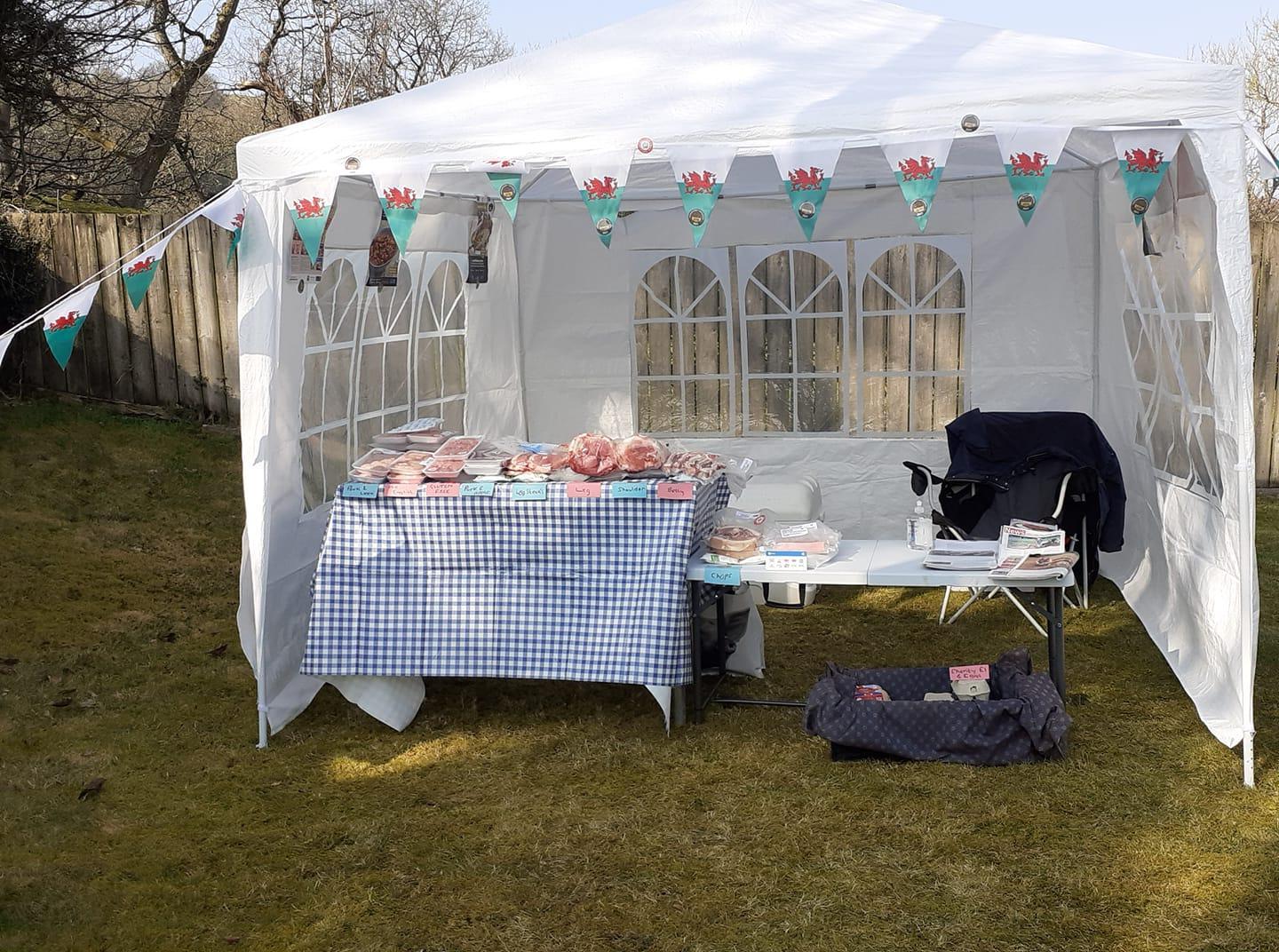
Trying to think of something different to make yourself stand out is hard in the current climate.Two years ago, we held an open weekend, very successful and great sunny weather helped, that put us locally on the map for sure and we had two litters around 10 days previous so there was plenty to see and talk about. Since our first pigs were ready for the abattoir in January 2018, we have used the same abattoir and butchers: DJThomas in Rhos near Wrexham.They dispatch the pigs on a Monday afternoon and the following week on the Friday the butchered pork is ready for collection from their cutting plant.All the pig carcasses hang for 10 days to enhance the meat.
Rhos is our nearest abattoir, and it is about an hour away. It is one of the few remaining small abattoirs in the area.They mainly deal with cattle and sheep, and we are hoping it will survive the increased costings of electricity to stay open. We send instructions what we want back from the carcass, and they prepare this for us. Items for curing get send to a specialist curer and they come back around 4/5 weeks after the dispatch date. Many abattoirs within an hour/ hour and a half from here, have closed or they do not handle rare breed / coloured pigs.
Valuing OSB Pork - doing what we do best
Valuing OSB Pork - doing what we do best
I am the one always here, I live and breathe pigs. My sonThomas who works on a dairy farm also helps, mainly transporting to the abattoir as I have never managed to get the hang of reversing a car with trailer.
It is loving what we do, making a difference to the welfare of raising animals and educating people that mass produce; indoors and quickly raised animals is not the way forward for the food industry. Having said that, I don’t think, for all the hard work, we will ever be millionaires. It is a labour of love.
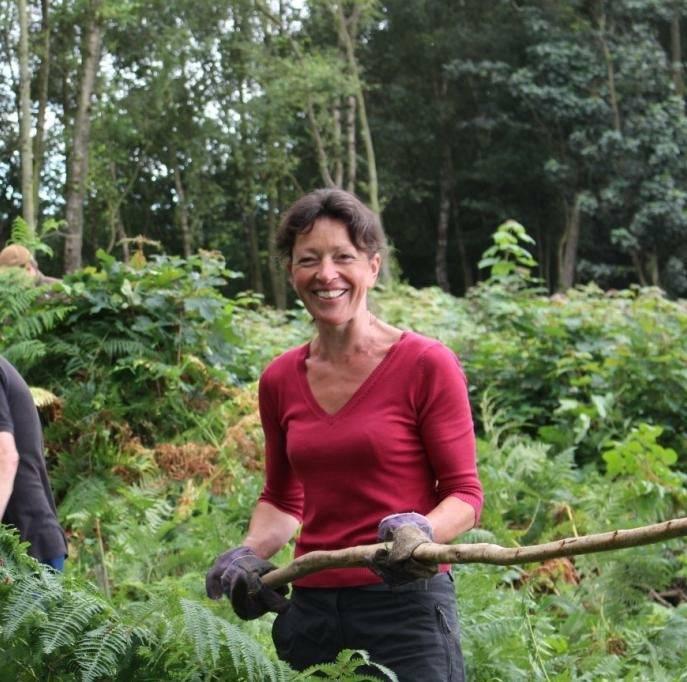
Our most popular pork produce is our Sausages, (Old English flavour and Pork & leek flavour), Gammon steaks, Bacon and Joints. Saying that, we don’t struggle to sell any cuts, chops and belly slabs are still in demand too. With this being a rural farming area, mainly sheep !! we stand out with our pigs!! there is still a good ask for joints for the traditional Sunday roast dinner. When our pork comes back on a Friday, we sell it fresh until the Monday, after which we place in the deep freeze. Pork is one product that freezes well.
Being a member of Wales ”Porc Blasus” : meaning delicious Pork, an on-line Welsh pork producers and butchers group, we receive lots of recipe cards which we enclose with our pork boxes and hand out with our sales. We are also linked with Mentor Moch Cymru who are developing the pig sector in Wales.
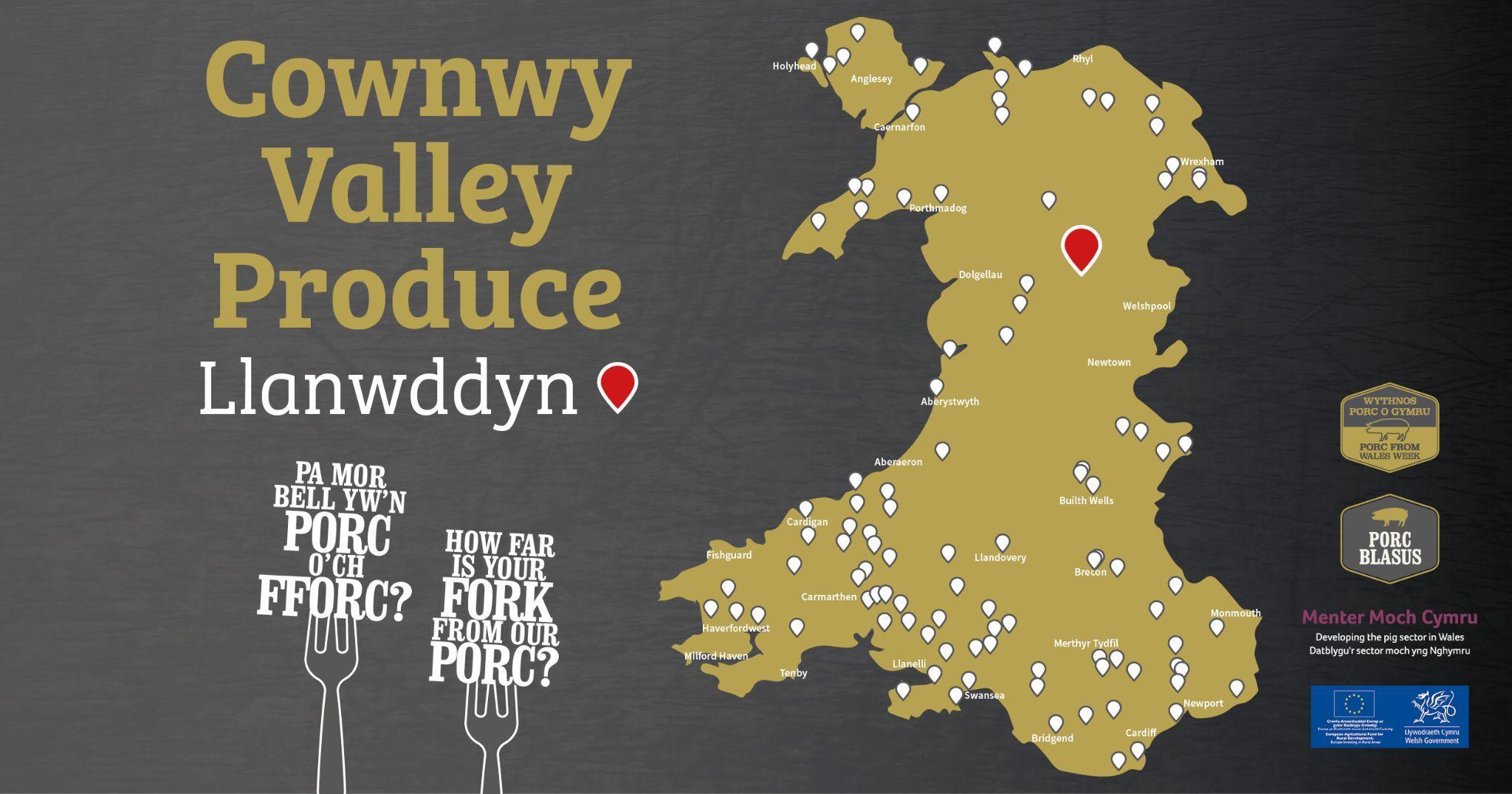

On average we have around 25-30 pigs on site (including our breeding stock) from a variety of ages. In the winter we keep our stock levels lower due to the more challenging weather, it gives us a chance to rest the summer paddocks too.
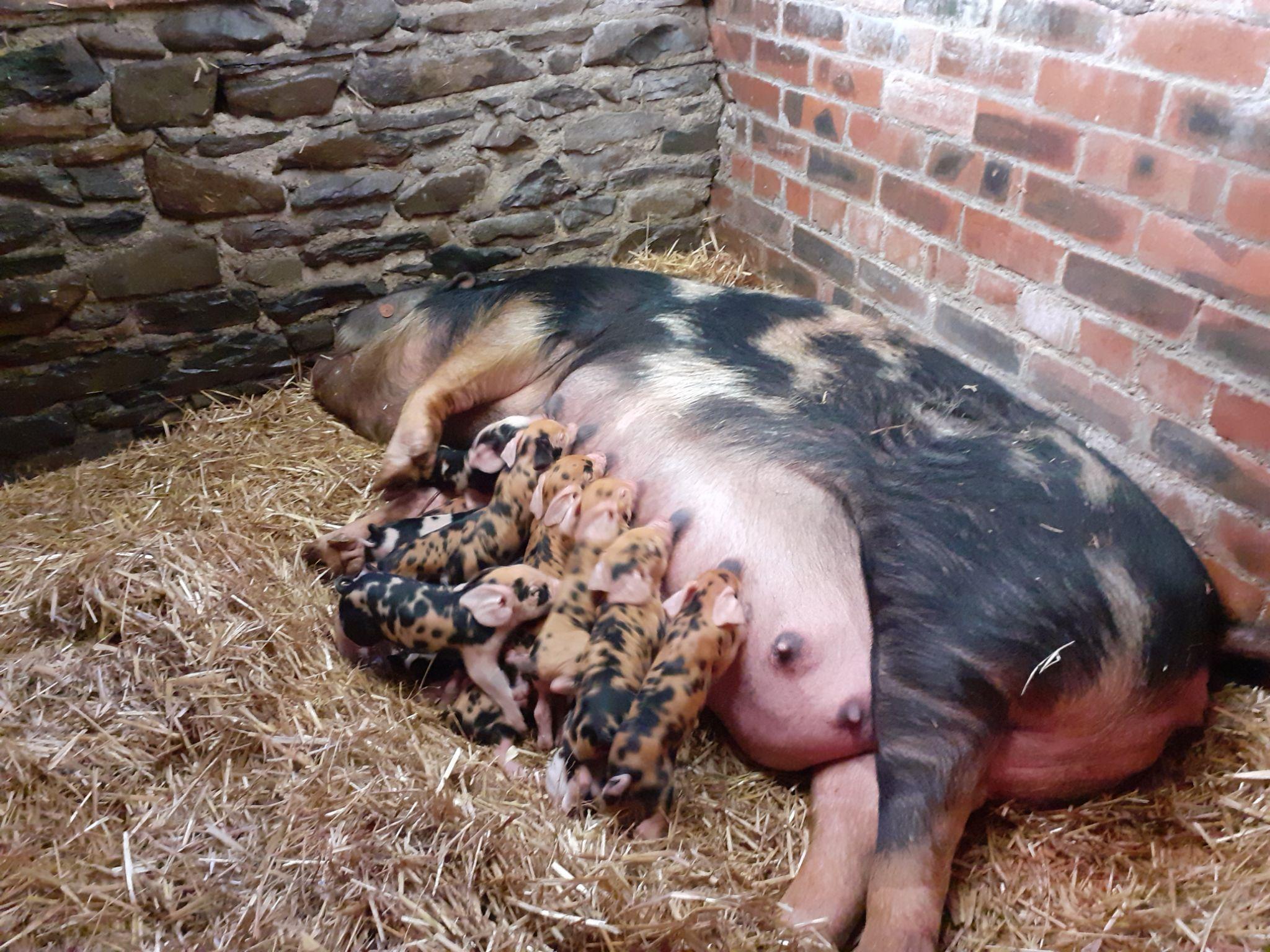
As I am writing this we have Boris the breeding boar, Mary hopefully in pig, she did not give us any litters last year, Elsie with a litter of 5 at nearly 3 weeks old, Blondy -our Iris sow- was served 10 days ago and Bonny our Tamworth with a litter of 2 ! (she crushed 5 ) . The twins will be a month old later this week. Then we have a mix of 3 to 6 month old growing pigs, to supply us with pork for the next few months.Always thinking 6 months ahead, making sure we have pork in the freezer and fresh pork for our pop-up stall each month.
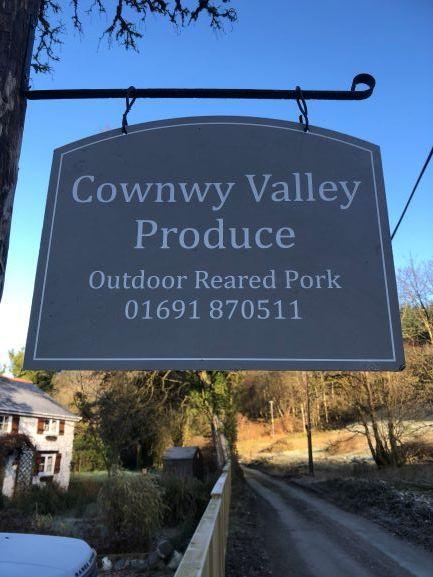
Oswestry SY10 0NH
Cownwy Valley Produce Tyn y Ddol
Llanwddyn
Education: Our Pig Keeping Courses
The Oxford Sandy and Black Pig Foundation Charity is committed to preserving and promoting the heritage breed of pigs, known as the Oxford Sandy and Black pig. One of the ways in which the charity achieves this goal is through their Pig courses, which are designed to educate people about these unique pigs and their role in British farming.

The Pig courses offered by the Oxford Sandy and Black Pig Foundation Charity are suitable for a range of audiences, from those who are simply interested in learning more about these pigs, to people who are considering keeping them as a rare breed. The courses are suitable for smallholders, hobbyists, and anyone who is interested in sustainable agriculture.
The courses are available both online and on-farm, with options starting from just £65 per person.The online courses are instructor-led, meaning that participants can learn from experts in the field of pig farming.The courses cover a range of topics, including pig husbandry, breeding, feeding, pig regulations and welfare. Participants can also ask questions and engage in discussions with the instructor and other learners.
For those who prefer a more hands-on approach, the on-farm Pig courses offer bespoke training tailored to the needs of the individual or group. Participants can learn about pig handling, housing, and management, as well as practical skills such as farrowing, castration, and identification.
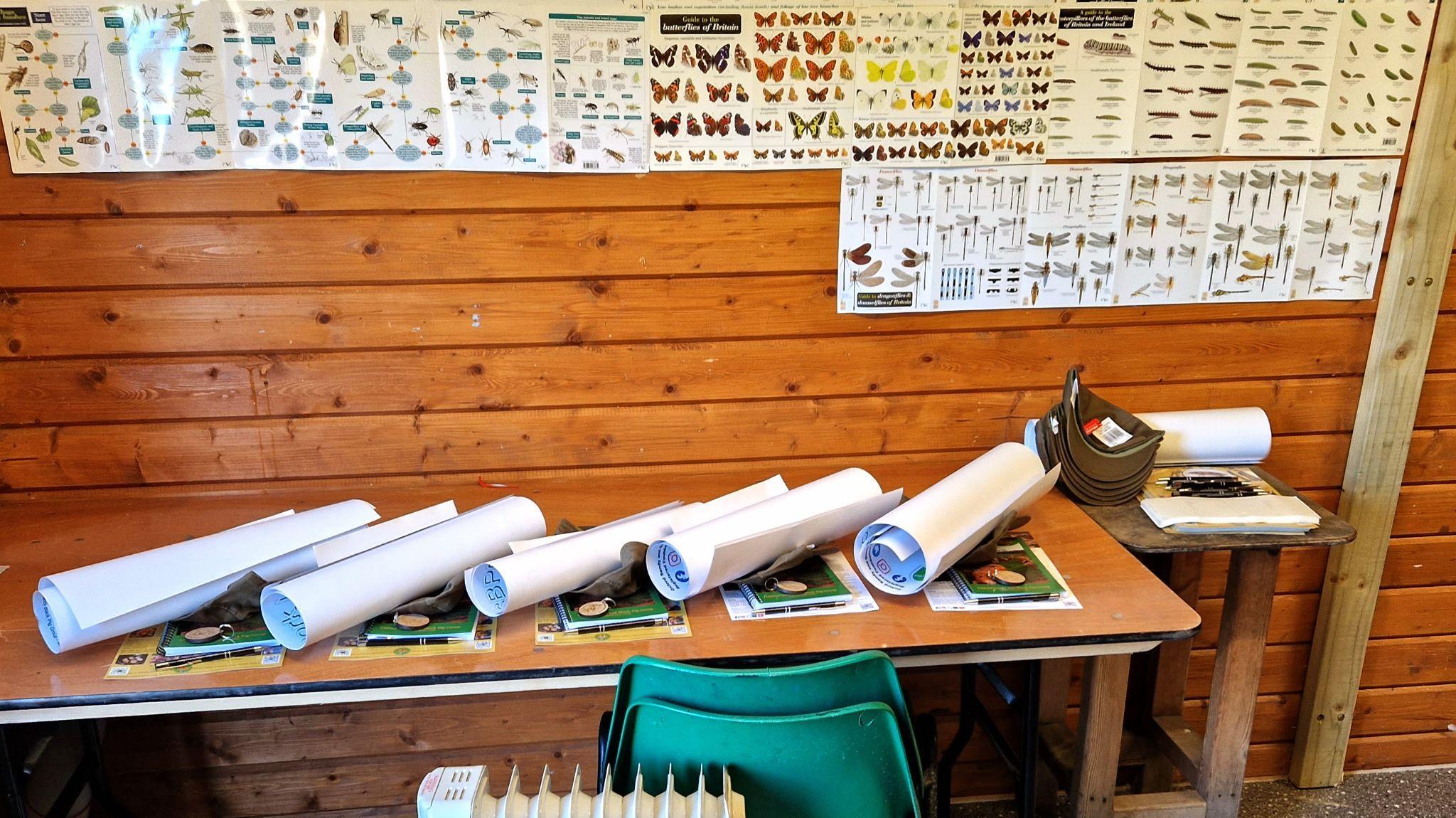
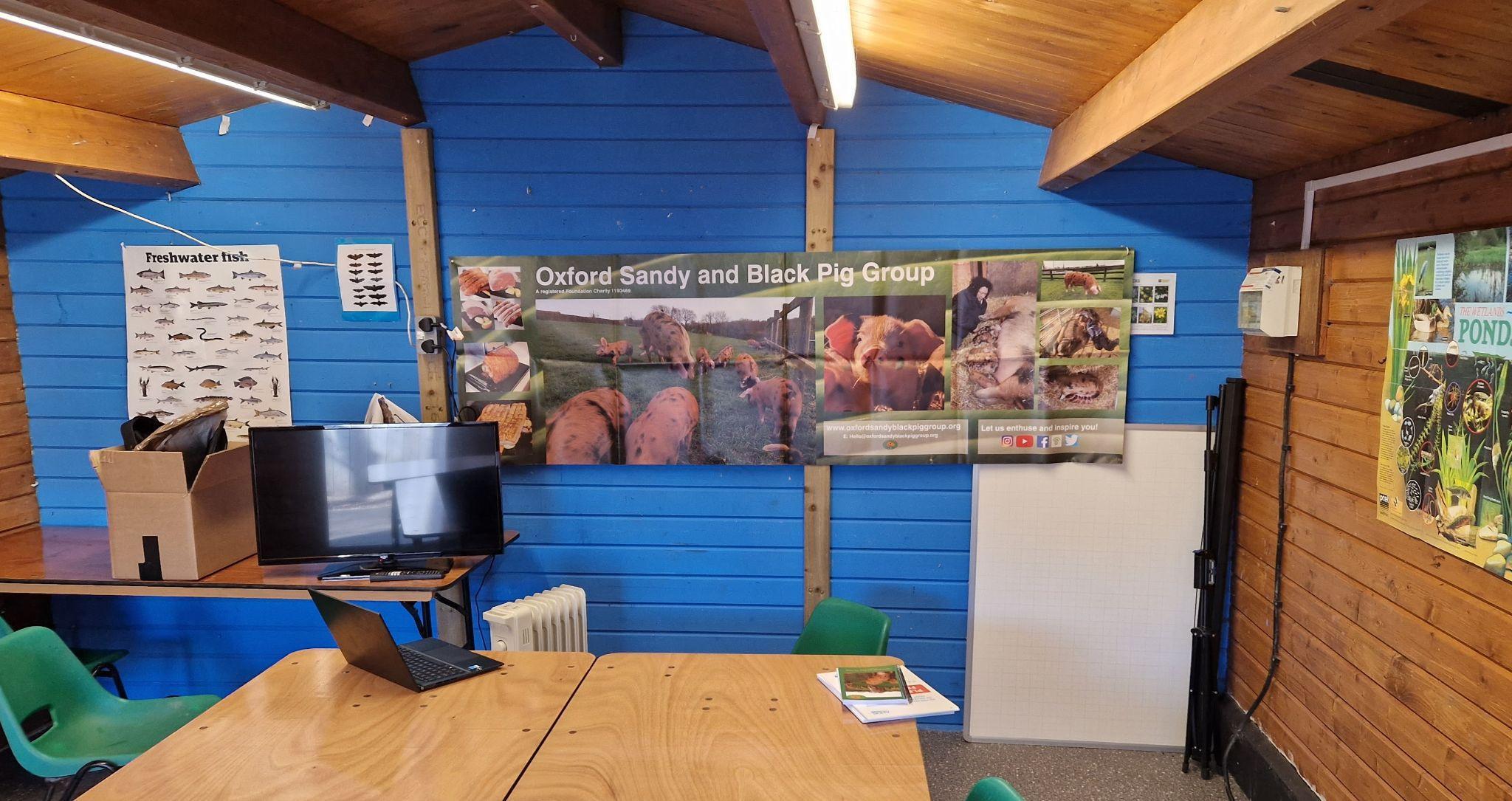
Education is one of the key goals of the Oxford Sandy and Black Pig Foundation Charity, and their Pig courses are a great way to learn about these unique pigs and their place in British farming. By taking part in these courses, participants can gain a deeper understanding of sustainable agriculture and the importance of preserving rare breeds.
For more information or to register your interest, email courses@osbpg.org
UK
Qualified competent attendants
Mike and Jayne Carter, long time supporters of the OSBPG Charity, are happy to lend a hand for those seeking transportation services for the movement of pigs.
● Mike and Jayne have a 750kg trailer and are both qualified competent attendants and have breakdown cover for both trailer and vehicle which includes recovering of trailers including livestock.
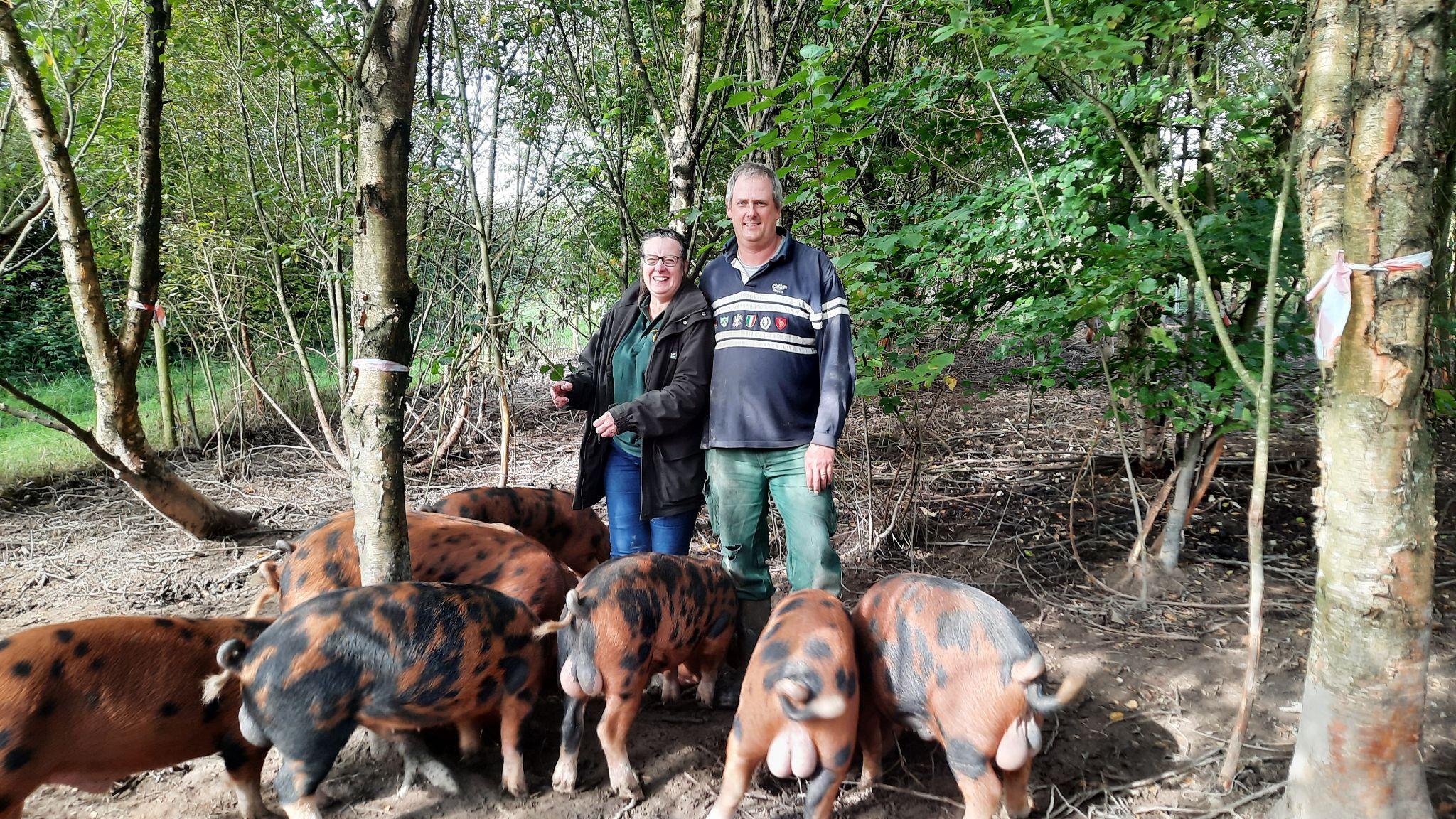
● In addition, Mike is also a HGV driver (retired from theArmy and use to driving heavy vehicles) and travels extensively up and down the country.
The logistics would be as follows:
● movement starts from Mike and Jayne (Wigan) to point of collection to point of delivery and return back to Wigan.
Trailer details is as follows:
● Small trailer max 750kg = 1 large pig male/female, or two 6 month old pigs, or 6/8 weaners. This trailer can be partitioned into 2 sections to carry one of either sex of medium size pig and weaners.
● Small trailer cost would be 80p per mile + VATbilled to purchaser.And if you qualify for the GSAyou may also use it in connection with the movement.
Requirements
● It would be advantageous to have an idea of weight of each animal being transported in the event of multiple pigs being moved..
● Loading and unloading would be the responsibility of the vendor/purchaser. In addition to the above we have copies of Mike and Jayne hauliers licence and their driver/attendants certificates for movement of livestock Category 1 up to 8hrs.

If you would like to find out more or book Mike and Jayne, please visit our website here

OSBPG PIG HAULIERS FOR
KNOWING OUR BOARS
The reproductive physiology of boars is intriguing because their testicular morphology and secretion of testicular steroids are distinctively different from those in other species. The testicles of boars contain a higher percentage of interstitial tissue and the volume of their ejaculate is unusually large, 50 to 400ml. Blood concentrations of estrogens in boars exceed those of estrous female pigs and their testicles produce significant quantities of the musk-smelling 16 androstene.
In the scrotum, testicular temperatures are several degrees lower than the internal body temperature owing to both its anatomical position and its integrated vascular plexus that cools the blood entering the testes. The
scrotum, by altering its wall thickness and varying the proximity of the testes to the body cavity, serves a critical role as elevated testicular temperature is detrimental to the production of viable spermatozoa and fertility.
During insemination of the sows, semen is deposited through the cervix into the uterus. Spermatozoa move through the uterus rapidly and enter the oviducts within 15 to 30 minutes after insemination.The lower region of the oviduct serves as a storage area for spermatozoa as they await the arrival of ovulated oocytes. In this area of the oviduct, ejaculated spermatozoa undergo capacitation, removal of proteins that were acquired in the cauda epididymis. Capacitation is necessary before spermatozoa can fertilise ova.
During puberty, testicular size increases at an accelerated rate. By the age of 17 weeks (determined on breed as Meishan boars are much earlier) formation of the blood-testes barrier are complete and the testicular size correlates with total daily sperm production. EG: at 11 months – 170 ml of semen is produced, with a total testicular weight of 606 grams.

Courtship.The boars testes secrete large quantities of 16-androstenes, both conjugated and unconjugated.These musk-smelling steroids accumulate in the submandibular salivary glands and serve as pheromones when dispensed with the boar’s saliva during courtship behaviour. At estrus, females recognise these pheromones, resulting in enhanced sexual receptivity.
Boar taint.Accumulation of the 16 androstenes contributes to what many regard as unpleasant “boar taint” from sexually mature boars. Boars distinguish themselves with their high testicular production of androstenes and estrogens. Commercial breeds are susceptible to this.The rarer and traditional breeds do not need to be castrated as the process is slower. It is also worth noting that the amount of fat is less in intact boars. With castrated boars having the most fat. Intact males are raised because they are more efficient (less food per unit gain and leaner) than castrated males; so marketed weights are around 90kg before boar taint appears.


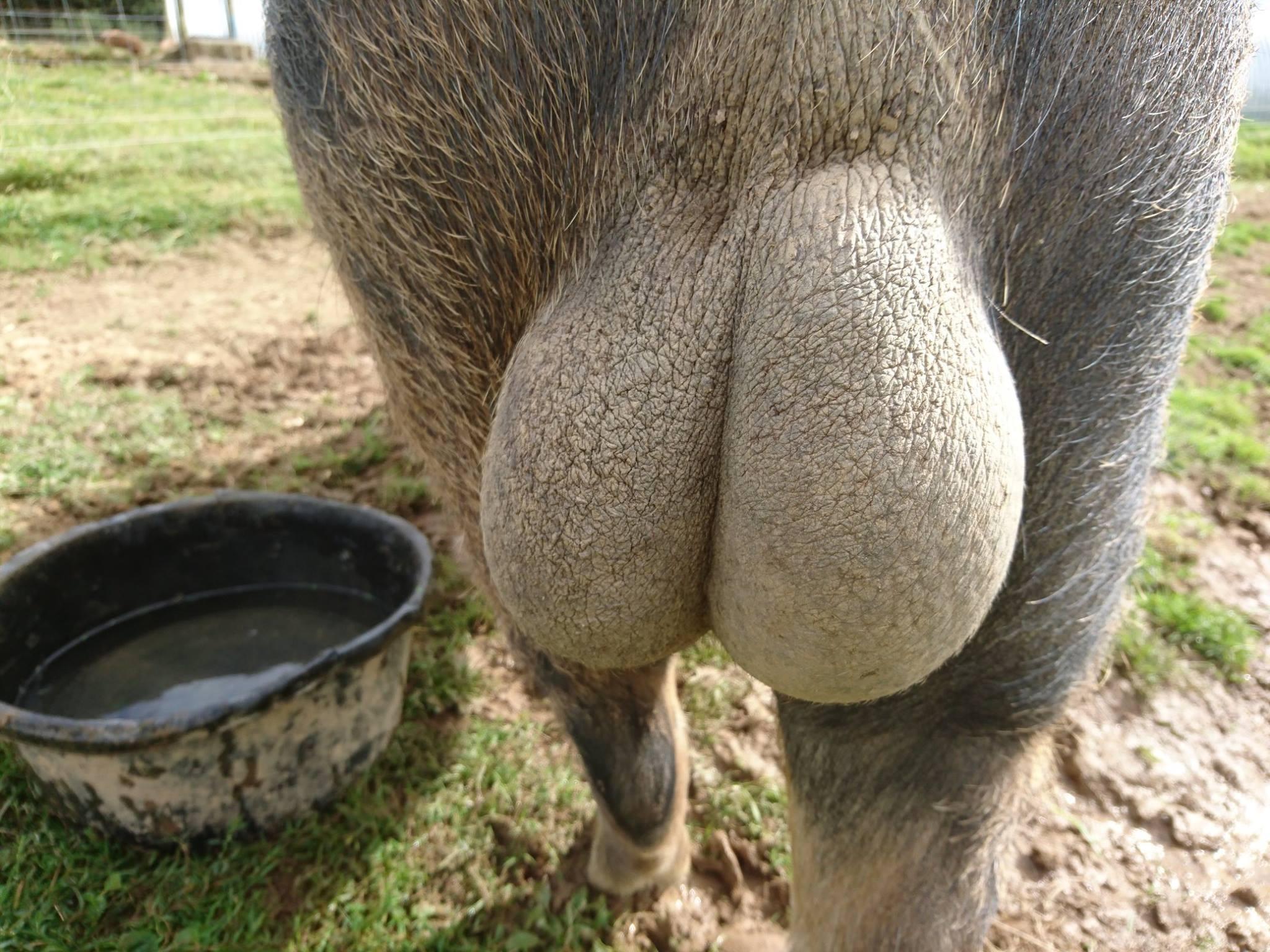
Among individual boars, sperm production is maximal after the age of 2 years and relates directly to testicular size, but testicular size is confounded with breed and age.The primary reason for not accepting boars into artificial insemination centres was poor sperm production.Therefore, with current expansion ofAI by pig producers, testicular size becomes economically more significant.

Factors that influence sperm production include social environment, light, nutrition and temperature. Social isolation along with lack of auditory and olfactory stimuli depresses sexual behaviour, but sperm production generally is not affected.The impact of light and nutrition on sperm production remains controversial, however, as long as extreme conditions are avoided their effects appear minimal. Elevated temperature adversely affects sperm production and intervention by management to reduce its duration and intensity in order to maintain output of high-quality sperm.
Boars normally produce 20 – 120 billion spermatozoa/ejaculate. So, Spermatozoa that contain theYchromosome have slightly less DNAthan those that contain the X chromosome.

Did you know that boars can serve as effective models for human research related to testicular development. Cryptorchidism and hypergonadotropism-hypospermia occur in pigs and in humans.
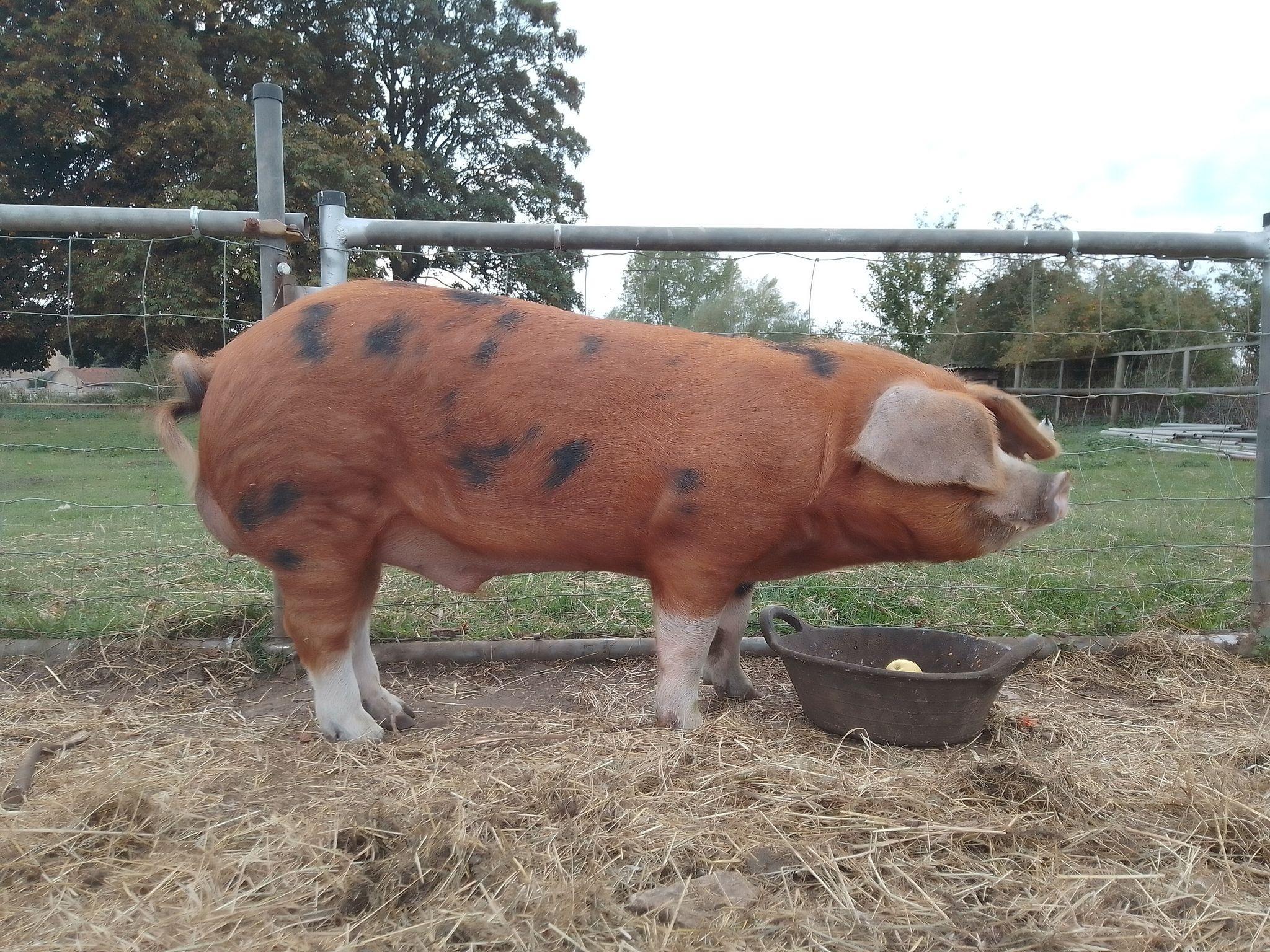
Knowing our Boars
Photo:Andrew Rock
OSBPG Fundraising Update ABigThankYou
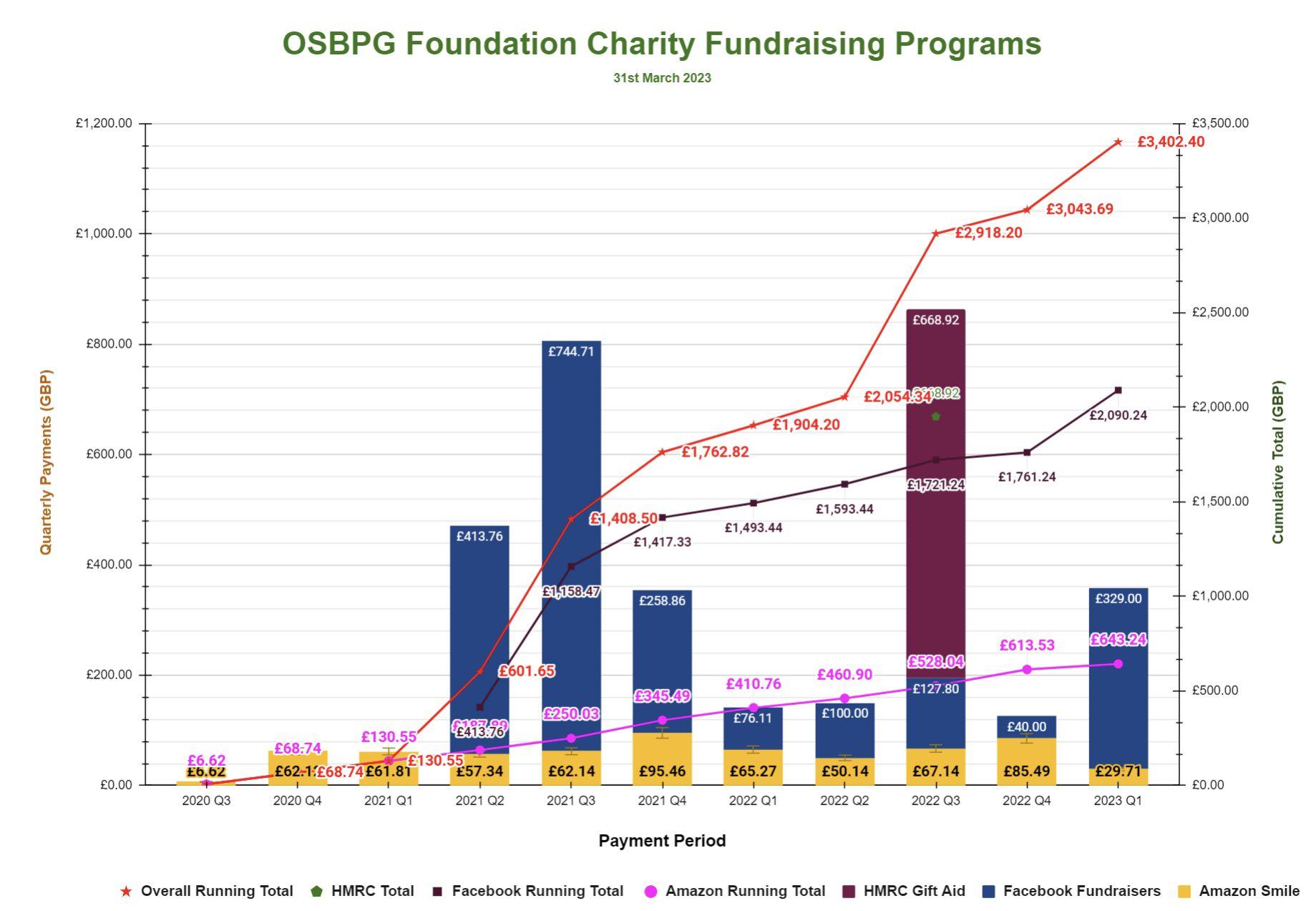
Since we became a charity in July 2020, your kindness and generosity through programs like Amazon Smile, Facebook Fundraisers and eligibility for HMRC’s GiftAid Scheme (Based on one-off donations from eligible UK taxpayers).The Charity has received £3,402.40
In Summer 2020 we joined the amazon smile program, where our supporters who use amazon can select us as a charity where we received 0.5% of eligible purchases.Through you selecting us, to date we have received £643.24. Sadly,Amazon shut down its Smile program in mid February 2023, we are expecting our final payment in the Summer.
Thanks to the generosity of our supporters on facebook using their fundraiser platform, in the Q1 of this we received £329, bringing the total from such kindness to £2,090.24
As we move into Q2, we will be processing our 2nd gift-aid request, and will bring you news on this in out next magazine.
You can also support us by “Becoming a Friend” and also clicking the “donate” button on our website

OSB PORK LABELS
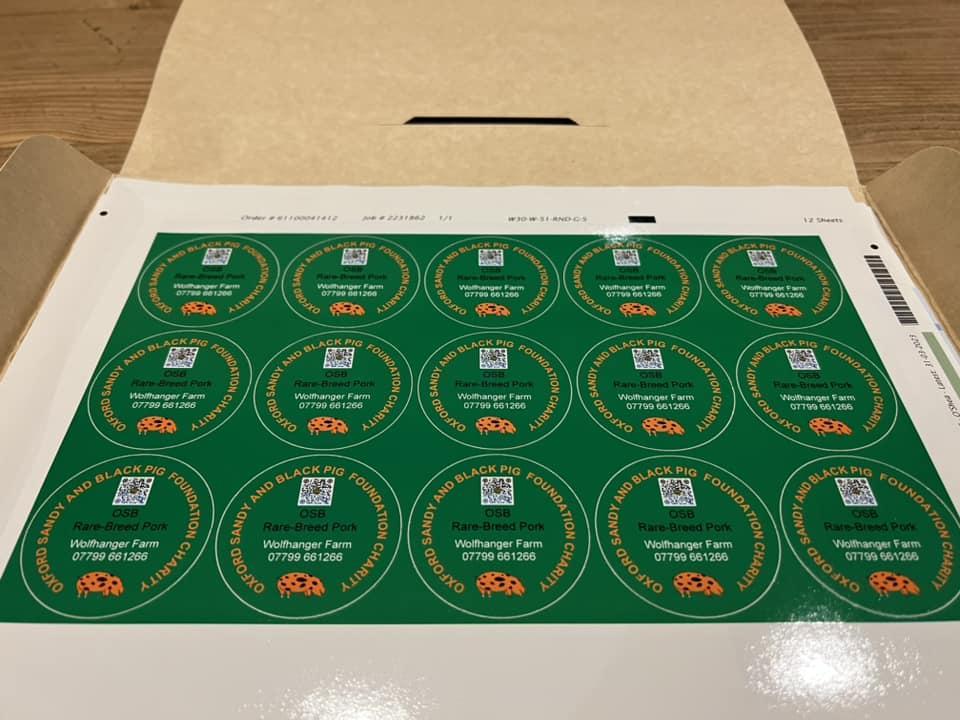
A HELPING HAND
The OSBPG Foundation Charity is always thinking of ways to help our independent pork producers.
Our pork is first and foremost as it is representative of our breed, its flavour, its texture, its colour and its versatility. The OSBPG Charity recognise the hard work and dedication from our independent producers, breeders and keepers of the Oxford Sandy and Black pig. Furthermore, we see the value in what you do, and as such Kathryn Green-Smith has designed the OSBPG Charity Pork labels. The labels are free and are in recognition of the value that you show in producing OSB Rare Breed pork.
Just like Mrs Dunnings you too can own your free 150 OSBPork Labels here


My Experiences of Owning and Raising Pigs
by Flynn Hardeman-Mason
Hi, my name is Flynn and I own a beautiful Oxford Sandy and Black Pig called Petal. My mum runs a care farm, TURN Care Farm CIC and back in 2019 we bought Petal as a weaner and brought her home. Petal was my pig and Mum had one called Ellie, but she wasn’t so great with the children so mum turned her into sausages! But that’s mums story to tell … back to me and Petal.
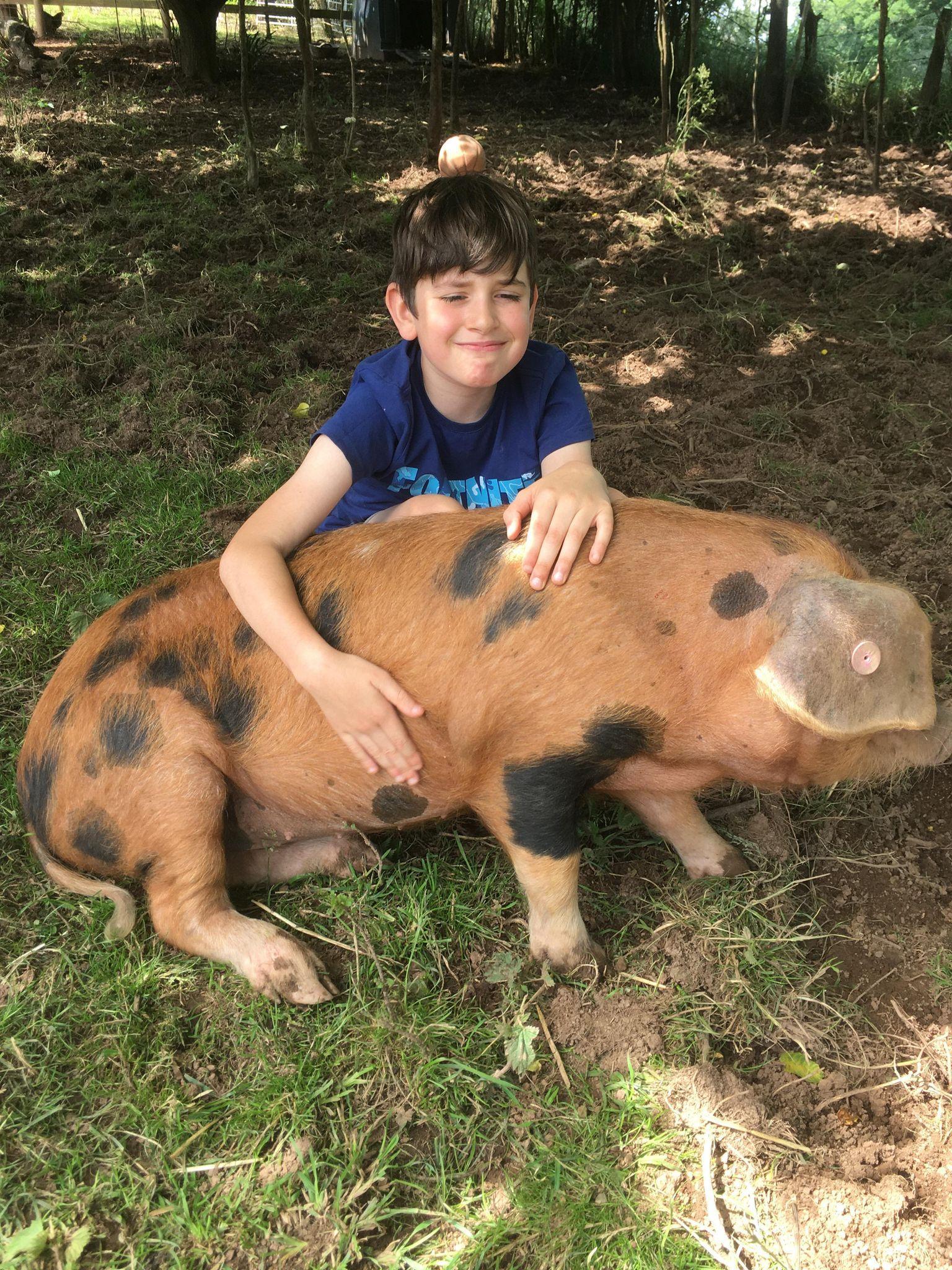
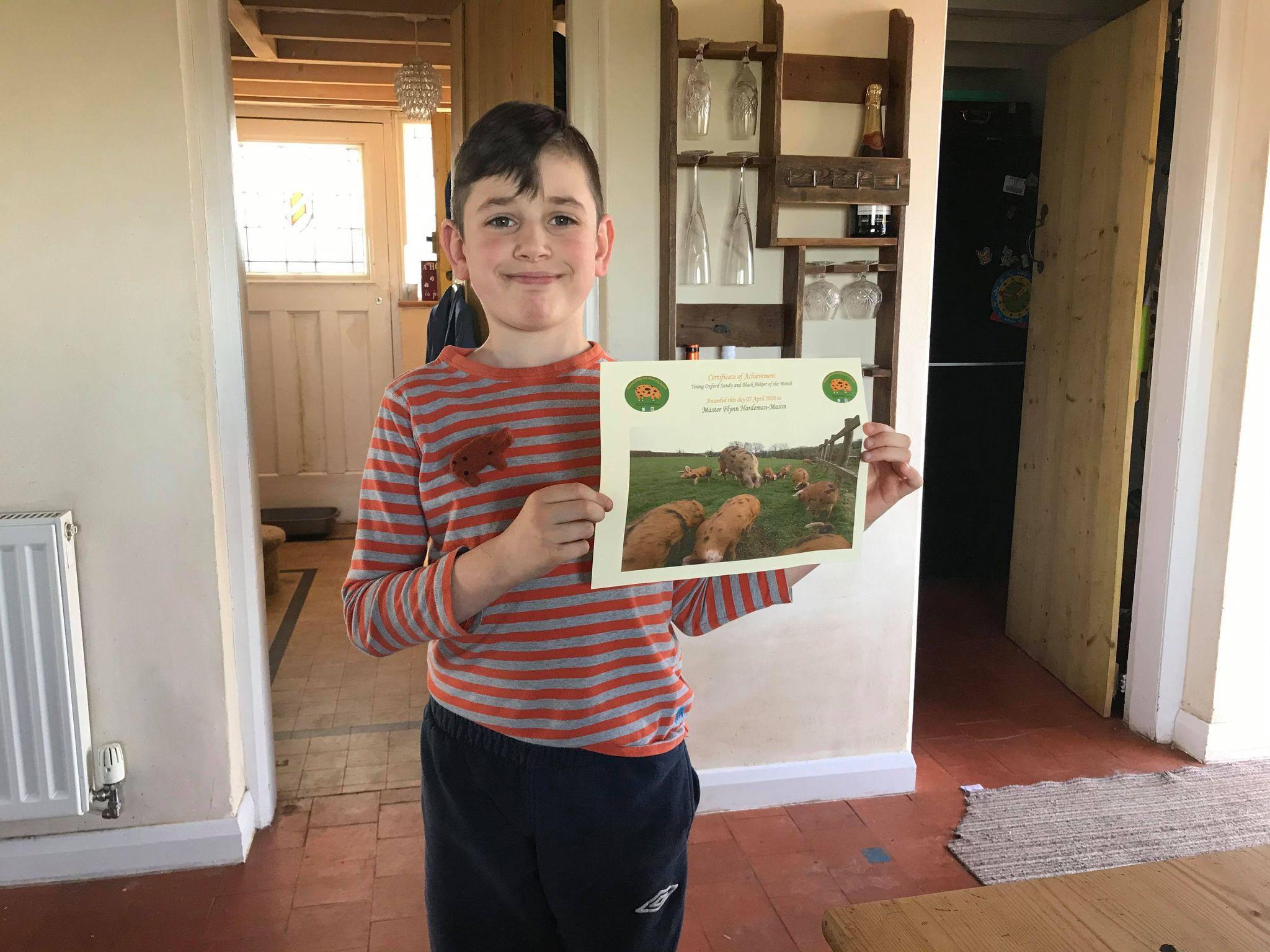

Caring for Petal as a youngster was a great learning experience for me because she is my first pig. I had to train her to respect the electric wire, watch her behaviour so I knew when she needed a new mud bath, fresh bedding and new enrichments and most importantly show her how to play football; something she still
does even now she is massive!
In the summer it was quite easy to look after her although I did find it a bit weird to begin with putting suncream on her and making her massive fresh fruit and veg ice lollies but in the winter it was a lot harder and i spent much more time keeping her ark clean and water tight by raising it off the ground on pallets weighted down with concrete blocks (my idea not mums – she wanted to put Petal in with the donkeys but I wasn’t sure she wanted to share her bedroom).
When Petal was two years old Mum and I talked about piglets and producing our own pork. At first I was a bit unsure about this aspect but I do eat meat and actually I felt better about eating our meat knowing how well it would have been raised than eating some cheap meat from the supermarket with no idea about how it has been reared. We decided to clear an old barn as the orchard Petal was usually in couldn’t have a farrowing area in it and then we found her a Gloucester Old Spot Husband. 3 months, 3 weeks and 3 days EXACTLYshe
Petal is an amazing mum she fed them all loads, didn’t squash any of them and always let me in to play with them. We did make an area for the piglets with a red light but Petal kept pushing the sheep hurdle barrier out of the way so we just let her get on with it. Her barn is literally at our back door so I went out loads (even in the night, don’t tell mum) to check on them.
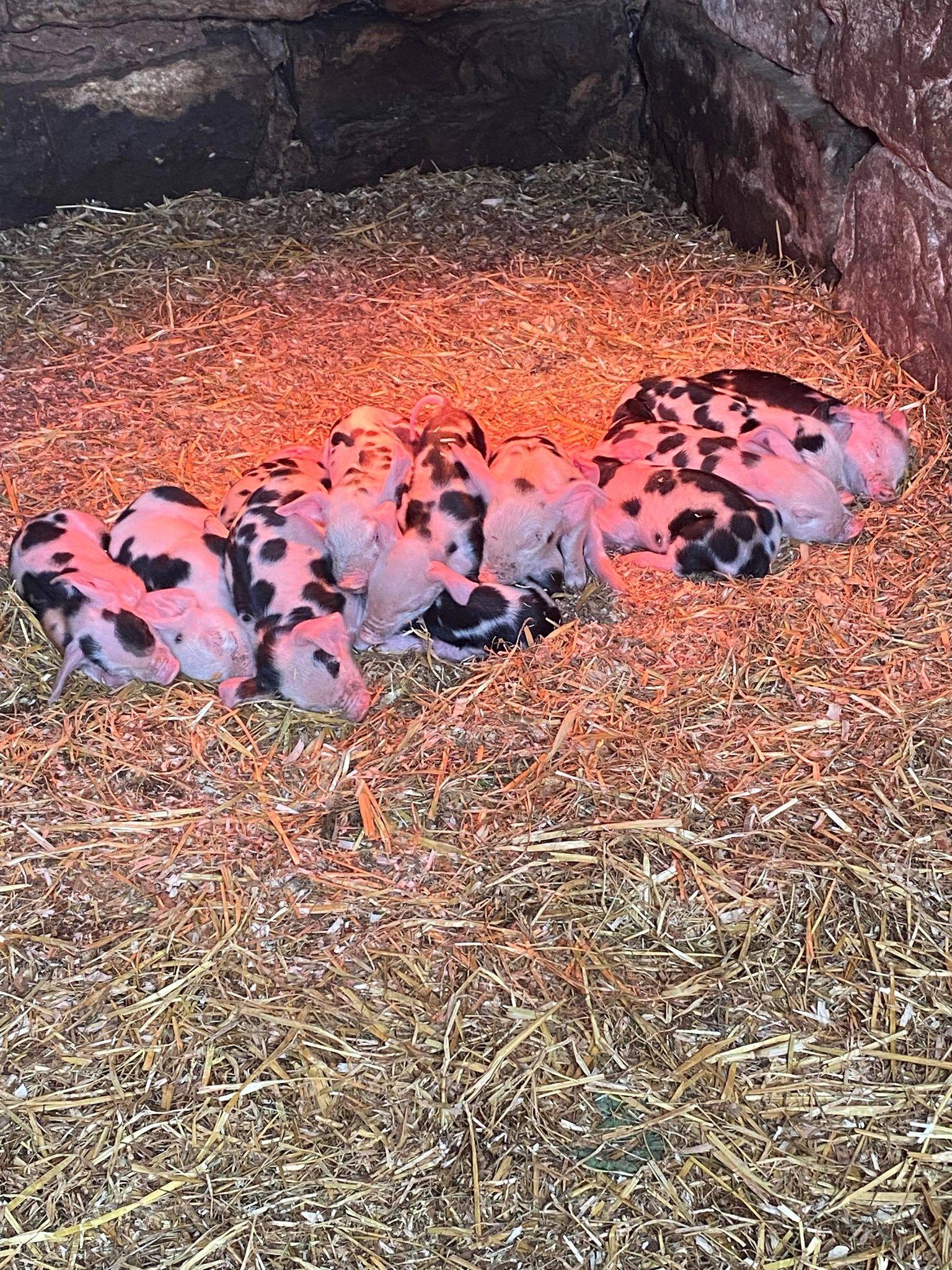
We decided to keep 4 to raise for meat and mum showed me how to measure them to get an idea of how much they weighed and we also tried to weigh them with a luggage scale (this was ok until they were over 15kg and we couldn’t lift them up). We are really lucky to have lots of natural forage for them including orchard apples, pears and damsons so by 7 months they were a good weight and I was able to load them with mum and take them to our local abattoir. I did feel a bit strange leaving them but mum just says “they only have one bad day” and that I should be proud of raising meat with zero carbon footprint as they travelled less than 2 miles to go from farm to fork and were raised 90% on organic foodstuffs with full outdoor access. So whilst I loved having piglets I love the amazing sausage and bacon we make too.
My friends ask me why I love my pig so much and i’m really honest. I tell them its because she is as smart as my dog, as clean as my cats and as loving as my guinea pigs but extra on that she produces amazing bacon seeds (piglets) that taste delicious.

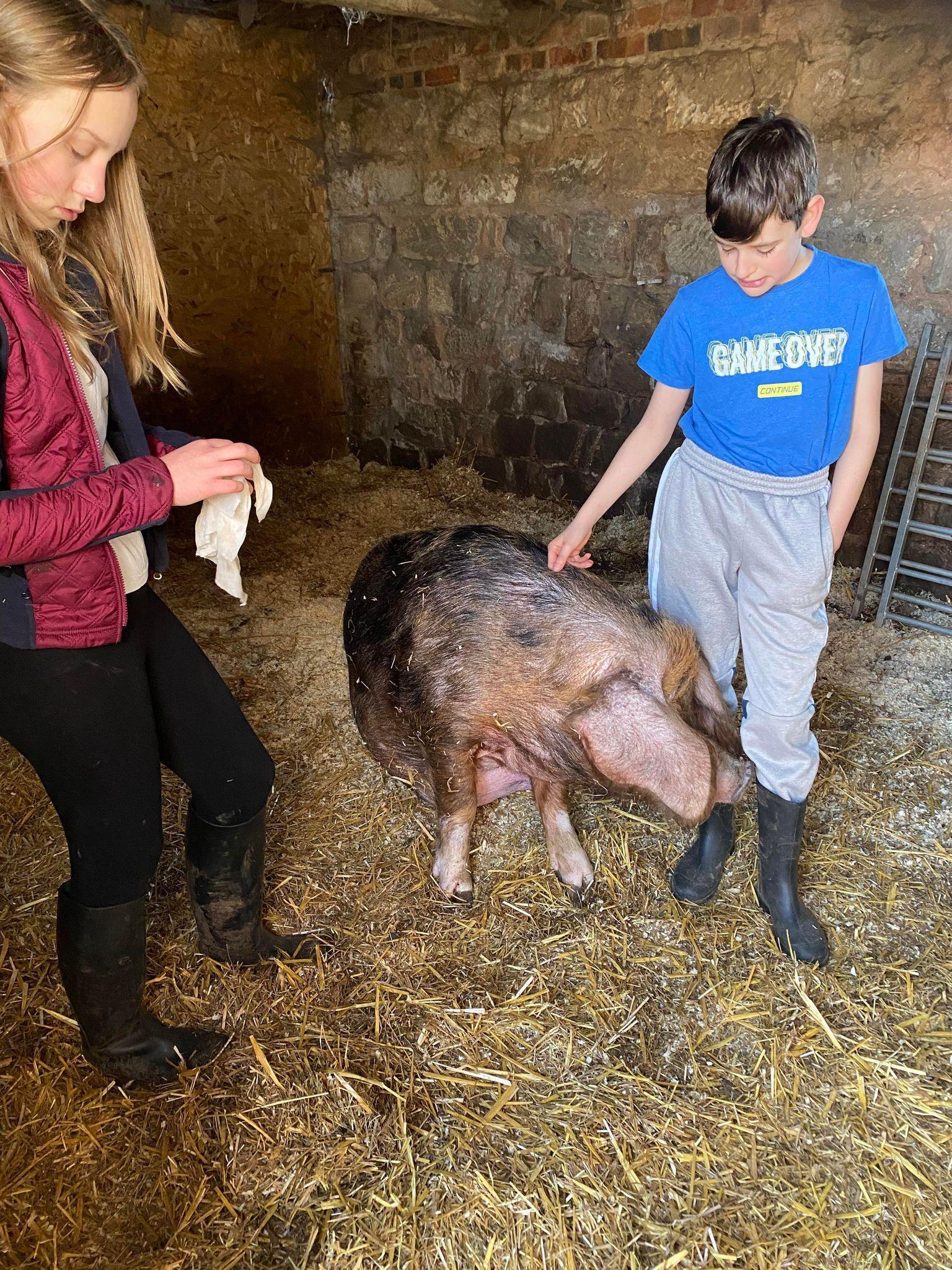

Farming through the eyes of a child
Genetic Spread Allowance
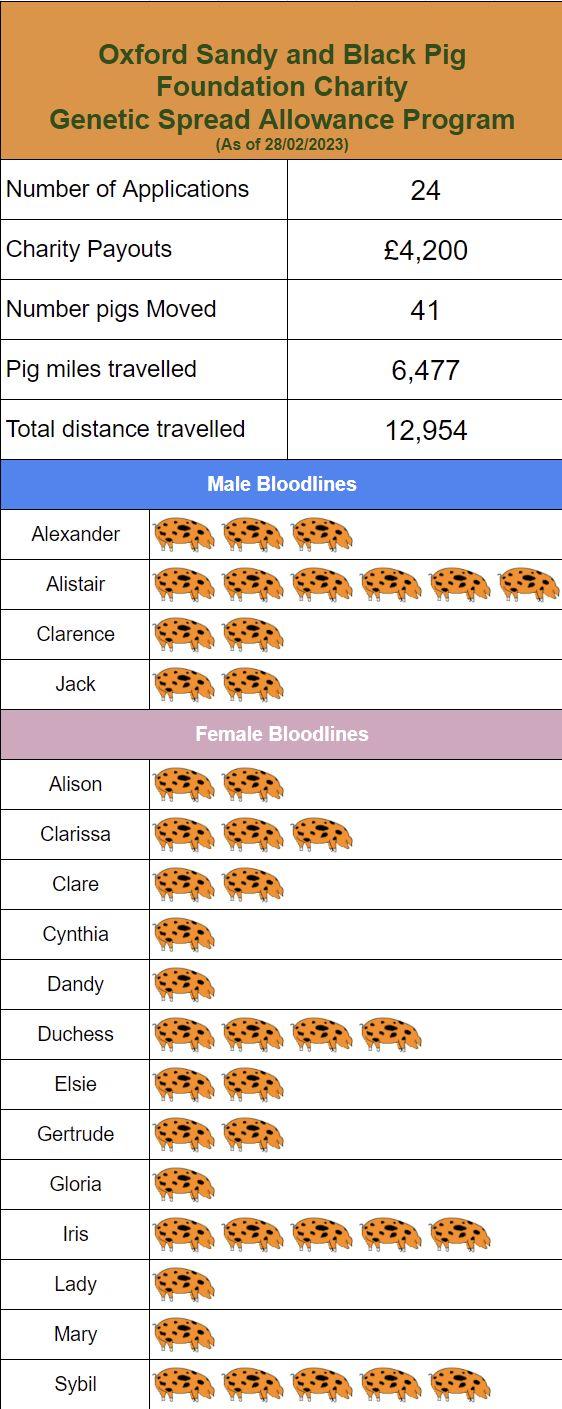
As of 28th February 2023, the charity has supported the move of 41 pigs all across the UK, adding key bloodlines to regions without or with low levels. Our supporters have clocked up a whopping 13,000 miles, this is the same distance as the earth is to the GPS Satellite Navstar 66 in orbit above us

The pigs themselves have travelled 6,477 miles, this is equal to the diameter of the earth.
Since the last update we have support the moves of Clare, Dandy and Mary lines, along with a crackingAlistair boar from the far north of England to Cambridge in east Anglia.
Our program has donated £4,200 to our members, supporting them with these key moves to diversify and conserve our dynamic Oxford Sandy and Black.

Vet Chat
Louise Blenkhorn
Louise Blenkhorn, BSc(Hons), BVM&S, MRCVS, is an independent pig veterinary consultant and a pig farmers daughter. Louise's private life is just as busy. Amother of two to Emma andAva. Louise and her husband Neil, run a successful herd of Limousin beef cattle.
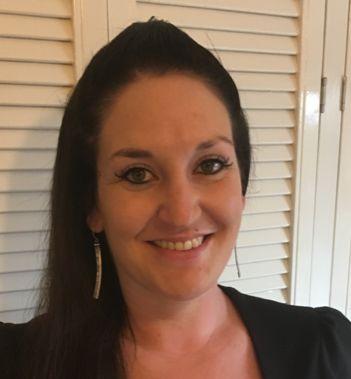
Farrowing - when to intervene
So, farrowing season is upon us.
I would like to run you through the farrowing process – we need to know what is normal so we know when to intervene.
The piglets are responsible for their birth date by secreting corticosteroids – in response to reducing nutrient availability - stimulating the placenta/uterus to produce the hormone prostaglandin.This directly causes the piglets to cease secreting the pregnancy maintenance hormone progesterone, initiating the birthing process.
If milk is abundant and easily flows when the teats are gently squeezed, then the sow is probably within six hours of farrowing. Restlessness and nest-building are signs that the birth will be in the 8 - 24 hours.
Intermittent abdominal muscle straining occurs before the birth of the first piglet, usually accompanied by shivering, with the sow drawing her upper hind leg upwards.The interval between piglets should gradually reduce as suckling will stimulate oxytocin release which will in turn strength uterine contractions.The average interval between piglets is 18-20 mins in sows and 12 mins in gilts.The average duration of farrowing is 2.5hrs in sows and 1.5hrs in gilts.
Reasons for failing to deliver piglets
• Dead or mummified piglets
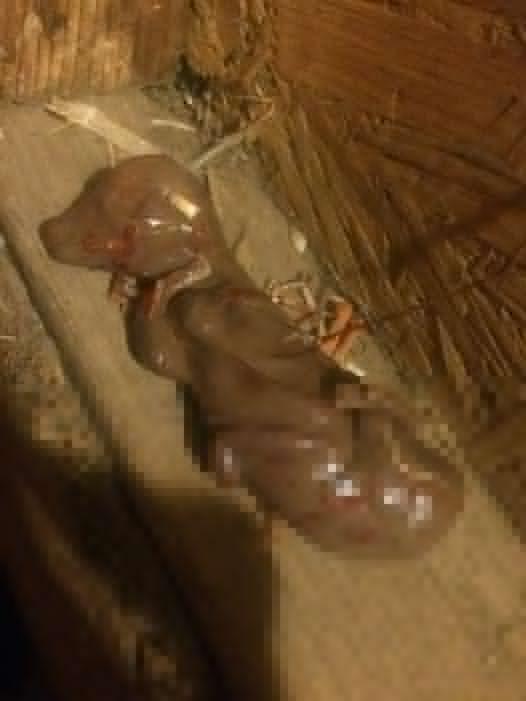
• Very large piglets and small pelvis
• Abnormal presentation of the piglets
• >1 piglet being presented at the same time
• Rotation of the womb
• Sow illness
• Failure of the womb to contract (uterine inertia)
• Stress of the sow (nervous/ disturbed)
• Over fat sows or those with very large litters
 Mummified piglet
Mummified piglet
When to intervene
● Interval >45 minutes between piglets
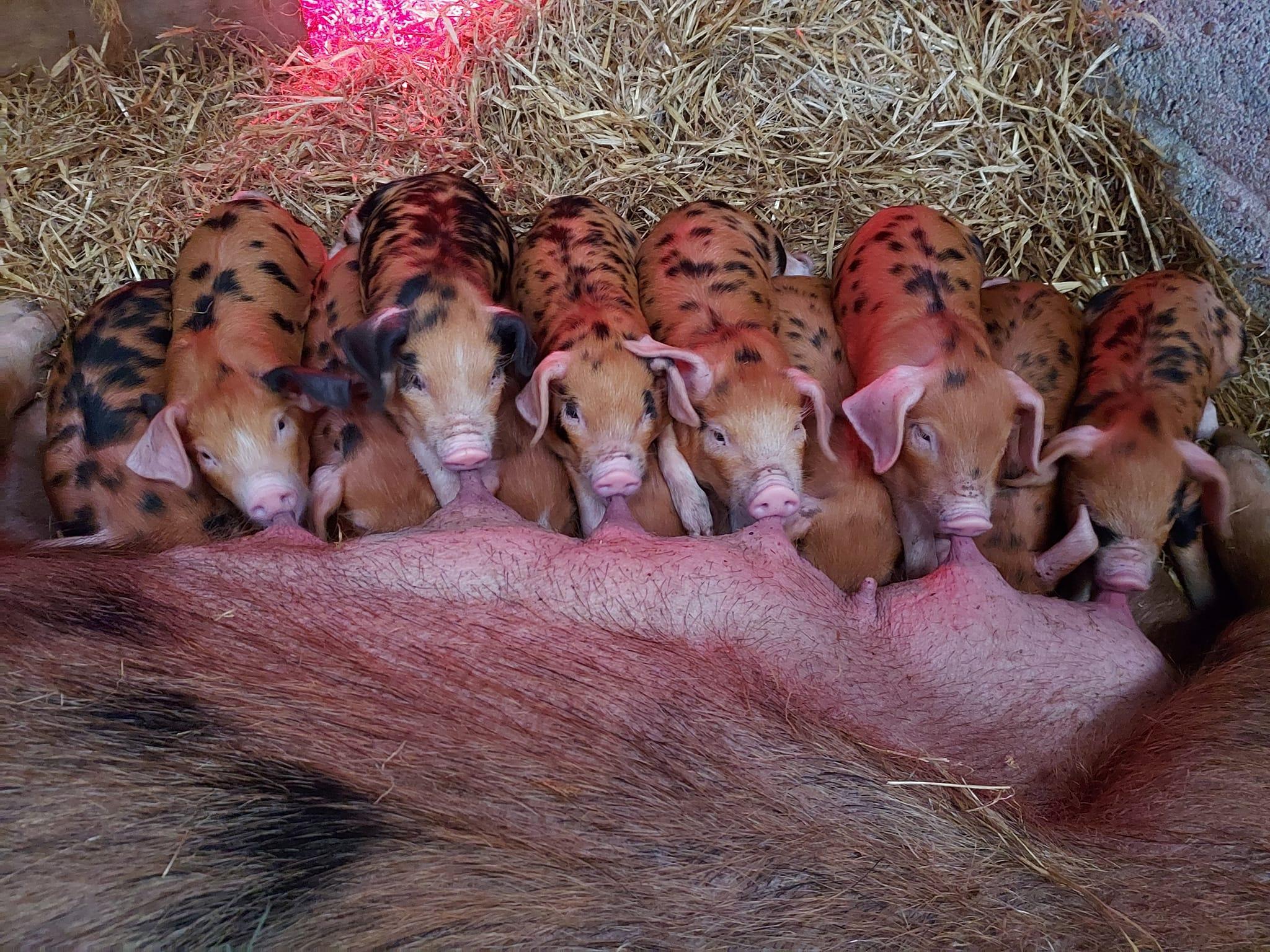
● Sow is showing signs of distress (contractions with no piglet, panting, blood from vulva)
● Meconium in the vulval discharge (green brown in colour and indicates piglet is in distress)

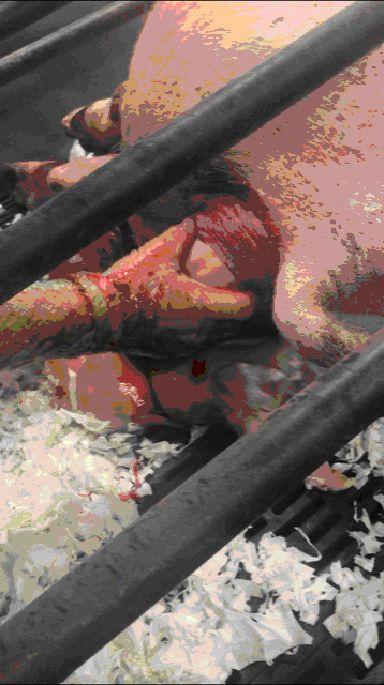
● Failure of delivery of placenta within 1 hour
● The degree of dryness of the piglets can be used to estimate time since last piglet delivered – but ideally count and record time
Farrowing assistance
● Wash your hands/arms and the sows vulval lips with soap and water and rinse well
● Wear a full arm-length glove
● Liberally use sterile lubricant
● Compress hand to a point and slowly insert in an upwards direction at an angle of 45 degrees until a piglet is felt.
● Grasp piglet by the legs or place finger in the piglet’s mouth supporting the lower jaw with your thumb. If possible, grasp the piglets head with your whole hand.

● Slowly withdraw the piglet.
And lastly – but most importantly - Key factors in piglet survival

● Birth weight
● Body temperature drop after birth
● COLOSTRUM INTAKE
Vet Chat
An Experience that Brings Appreciation
impact produce, so low miles was important to us and although they did feed our family, along the way these two spotty ginger bundles of energy gave us so many funny tales and adventures that we hadn’t really expected.
The one memory that I will never forget was when we were feeding our pigs apples straight from the orchard and one started drooling a lot and then coughing. It appeared that a small apple had got itself stuck in his throat. So being new to keeping pigs and having no idea of what to do in the situation,Alastair jumped in their pen and did as you would to anyone else choking, he tried giving the pig the Heimlich manoeuvre.As I watched him struggling away, as if he was trying to hug a pig that hated him, and riding it in a strange way, the panic disappeared and hilarity kicked in. It was the funniest thing to watch and thankfully it worked.As the autumn brought apples in abundance it also brought the end to our first OSB pig adventures. It was always important to us that our animals had a stress free, and happy life and we wanted to ensure the end was as stress free as it could be too.
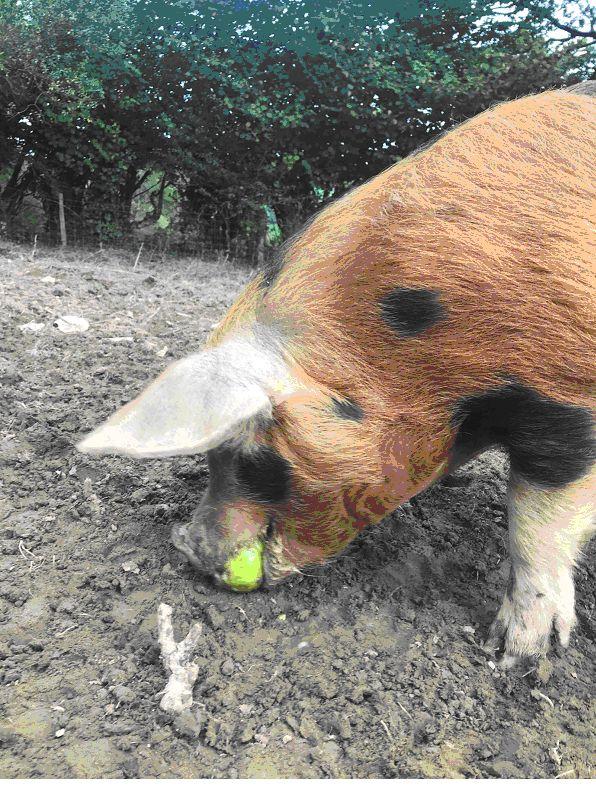 FromNatalie Revett
FromNatalie Revett
In 2016 our dream finally came true as my husbandAlastair and I bought a small holding in the depths of West Wales and our smallholding adventures first began with renovations, lots of renovations.
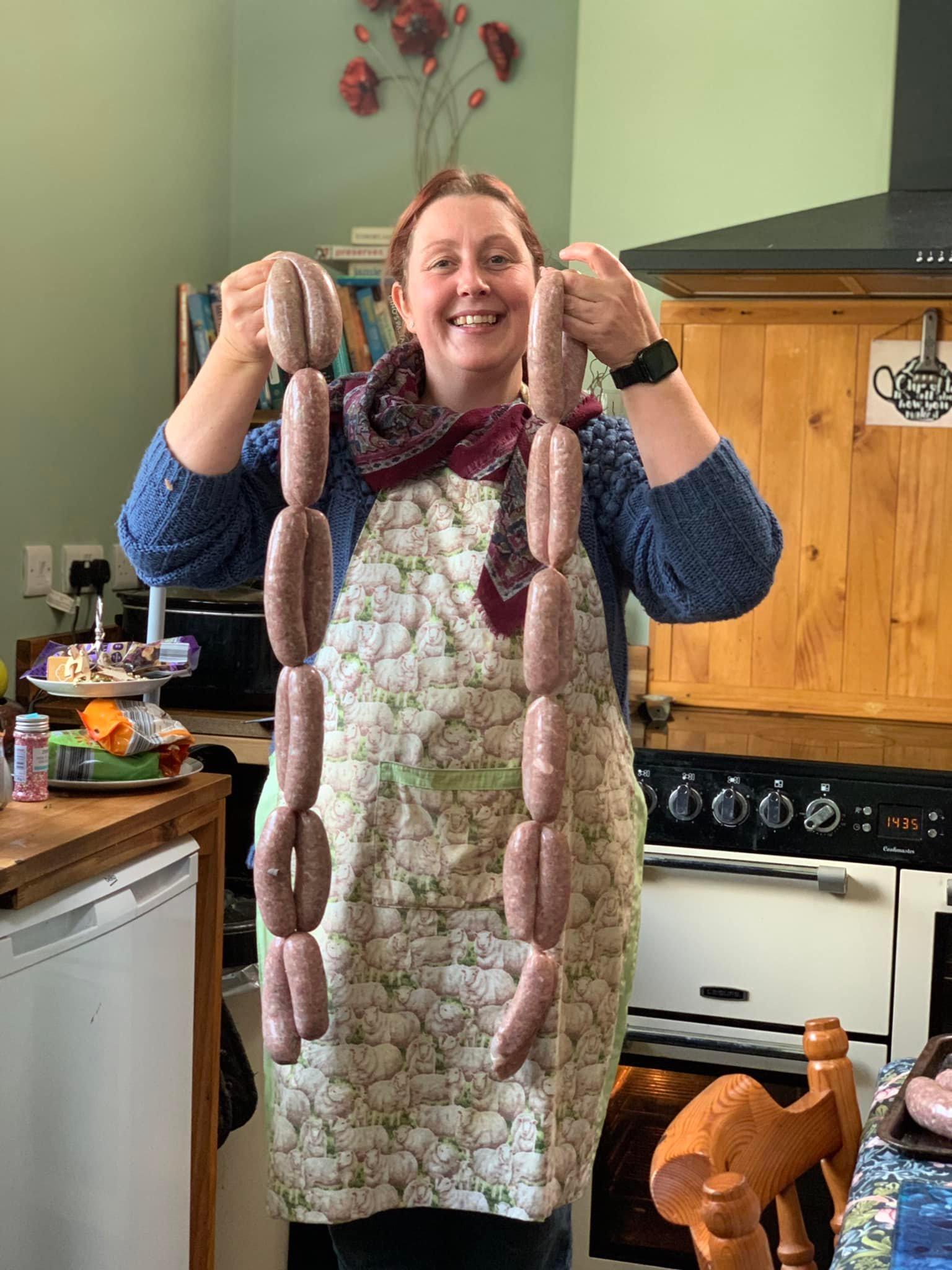
It wasn’t until 2021 when we first started our adventures with OSB pigs and our first OSB piglets were definitely serendipity for us. It was still around lockdown times so buying was still tricky and markets were restricted, so when we found some OSB weaners for sale only a mile down the road on sell my livestock we felt lucky. Our first OSB weaners destiny was to feed our family with high welfare and low environmental
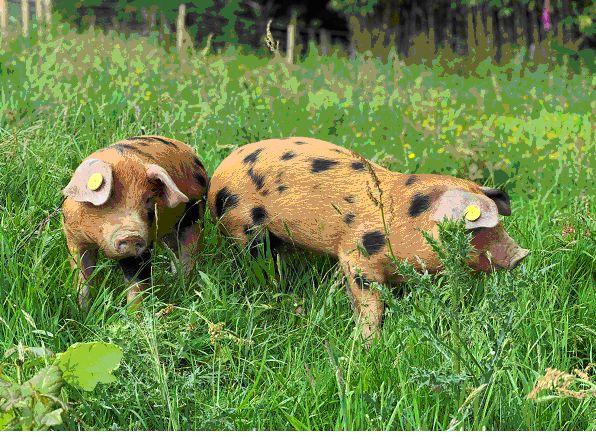

YourThoughts
This is when we opted for a home kill, as the meat was only for our family rather than for a commercial outcome. Having a home kill by a professional slaughter man, saved us having to pack the boys up in a trailer and travel them a good hour to our nearest abattoir. Instead they just went up to the shed for breakfast and unbeknown to them the gate shut for the final time for them. My husband stayed with them through to the end, as he wanted to see the whole process through and be a familiar face for them at the end.They then rested in a chiller unit for a couple of days on the yard and a few days later our local butchers rocked up at 7am to process the two carcasses, before they started their normal job in the shop at 9am. They were amazing and left me feeling in awe, but when it came to me packing and labelling the meat, I had seriously underestimated the time it took.This was just a couple of weeks before Christmas, so life was already manic and all this on top was crazy, but life is definitely a learning curve, and a steep one at that when starting off in this game. However once we had made our sausages, packed and labelled everything and got our first bacons and hams in their cure we managed to sit back and enjoy our first home produced pork chops, our first ever OSB pork chop and it was definitely the best chop I have ever eaten.
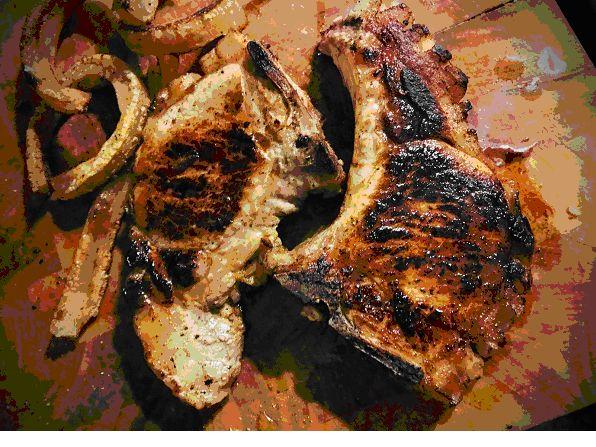
As our first OSB adventure was coming to an end we knew we weren’t ready for our OSB adventures to stop there, so we had the wonderful opportunity of purchasing their mother ‘Barbara’.
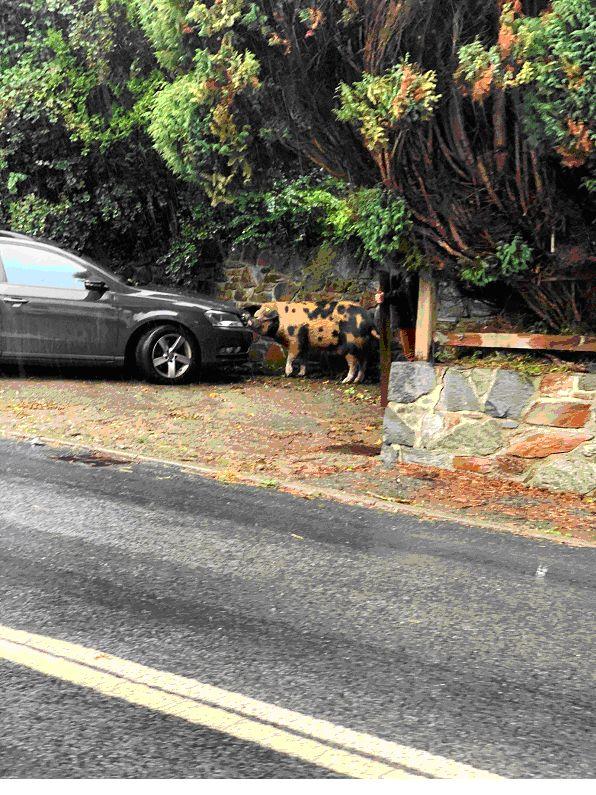

Barbara was expected to be in pig when we bought her, but unfortunately this didn’t end being the case. Nevertheless, she certainly did provide us with lots of wonderful OSB adventure tales, even from the first week we got her, when we got a phone call from a neighbour one wet Sunday afternoon to say “I think your pig is in the pub car park” and yep they were right. So we jumped in the car and raced to the pub quickly, as we were on a rare day out. We did make a fly-by pit stop at home to grab a jacket and some feed to try luring her back for the half mile walk home as we didn’t have a trailer for her. It was pouring down with rain and we were on our own with two young children, soAlastair drove with the children in the car rattling the feed bucket, as I tried ushering her up behind.

The traffic continued to drive along the road next to us as if we weren’t there. Perhaps I looked like I had more control over her than I actually did.
Then my dad pulled up to assist too and I managed to grab an old table top that was by someone’s house to use as a pig board and after a lot of persuasion we finally managed to get her home, but to this day we still don’t really know how she got out. Looking back at the dates though, I think she was looking for the boar again, but at the time we were sure she was in pig so it didn’t cross our minds. I’m sure many of you would be able to offer some great advice on how we could have got her home easier, but I guess it’s these memories that make keeping OSB’s fun. They are always their own characters and our adventures with Barbara definitely continued.
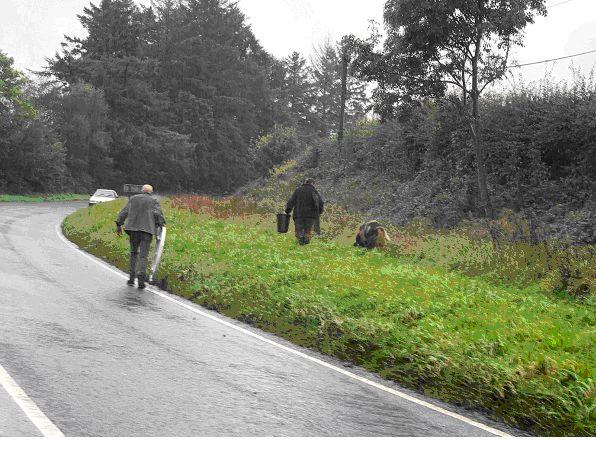
Your Thoughts
Barbara was very musical and always enjoyed playing with the chimes we made her and her jingle bells at Christmas.
Although the adventures with Barbara were great fun, we needed to remember that we got her to breed from and as she unfortunately wasn’t in pig when we got her, we tried to look for a new OSB boar for her. In the depths of West Wales, finding her a suitable OSB boar deemed to be impossible at the time and we kept drawing blanks.
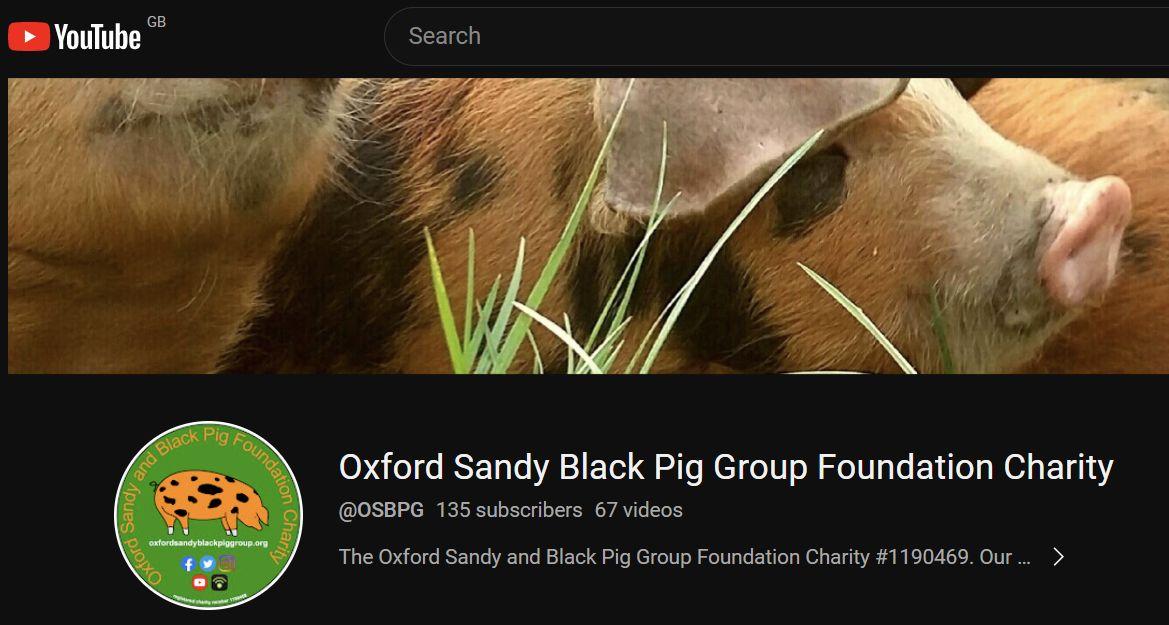
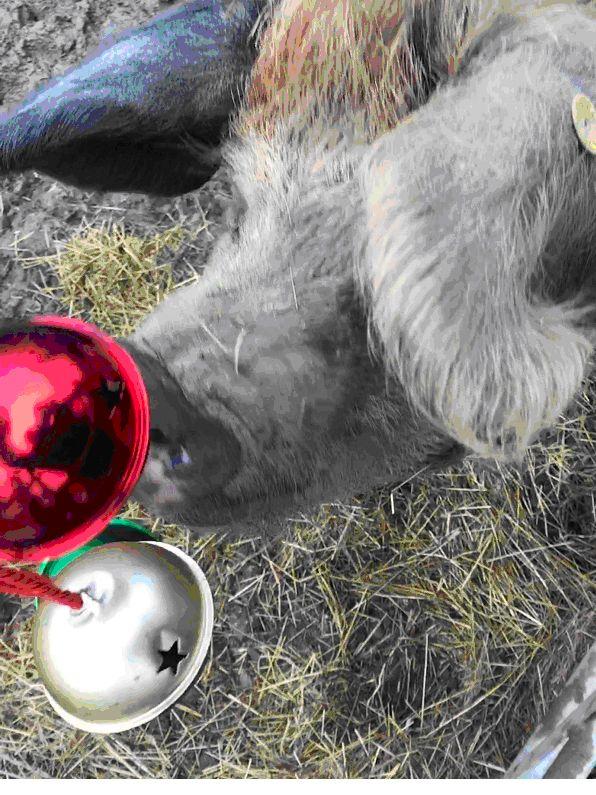
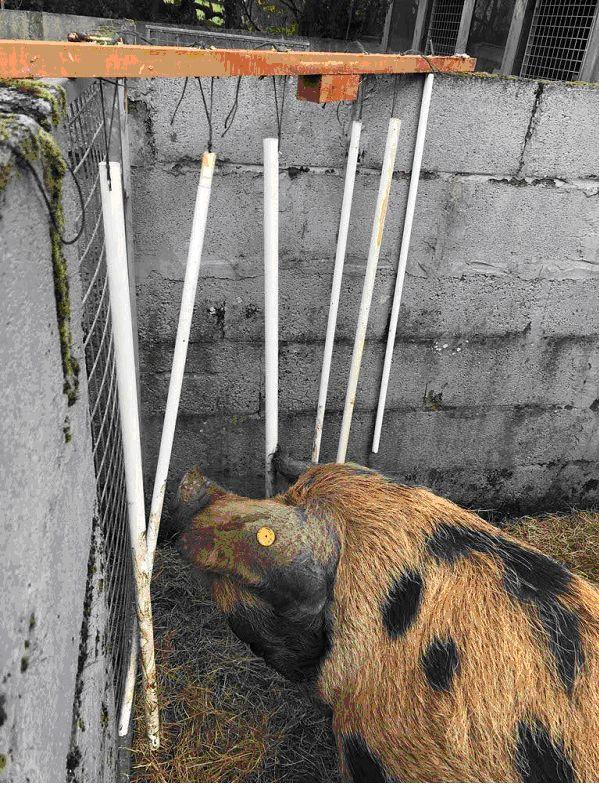
We took some guidance from a friend and decided to tryAI instead, but this again brought lots of fun and games but unfortunately never worked for us. It seemed our OSB journey was coming to a bit of a standstill and we sold Barbara to a nearby play farm who were looking for OSB sows to join their breeding programme. I’m pleased to say that although our OSB adventures stood still there, Barbara’s didn’t and since then she has gone on to have another two litters and we will hopefully be having three of her next weaners to continue our OSB journey again very soon. So watch out on the OSBPG Facebook pages for more of our OSB adventures and cook-alongs.

Your Thoughts SUBSCRIBE NOW
Join Us and Subscribe onYouTube
Ingredients
● OSB pork, cubed
● mango chutney, curry powder
● natural yogurt
● handful chopped coriander + extra to garnish, salt & pepper
● basmati rice
● 1 sweet potato, cubed, 1 onion or shallot, chopped, 2 garlic cloves, chopped
● 1 tbsp tomato puree
● spinach (fresh or frozen)
Mango Pork Kebabs with Sweet Potato and Spinach Rice
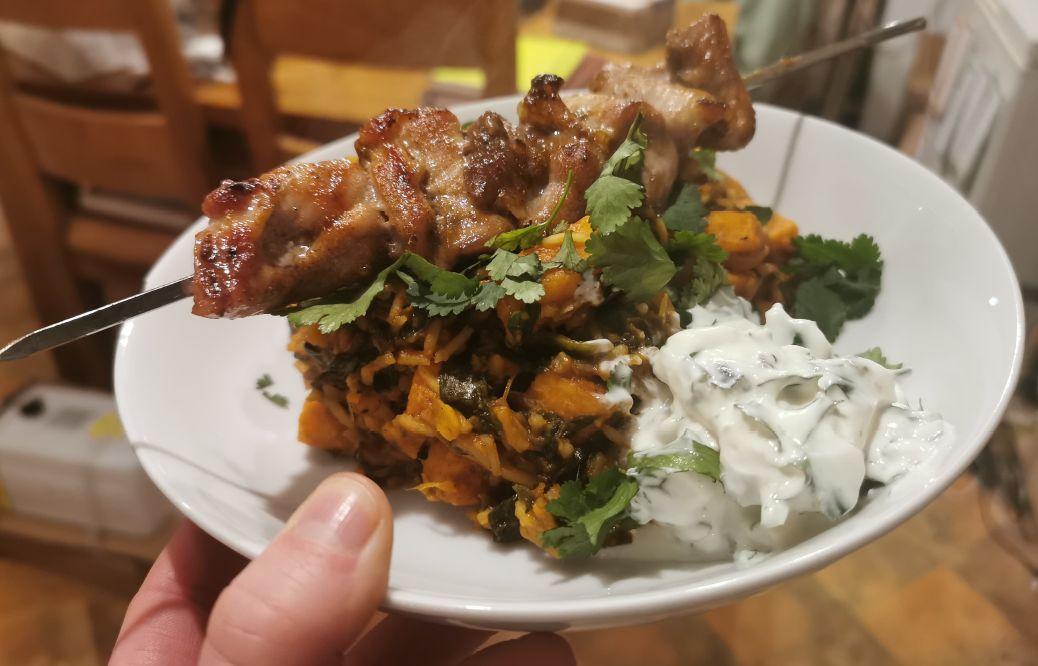 By Bec Nutton
By Bec Nutton
1. Skewer the pork onto sticks and coat in mango chutney with a teaspoon of curry powder mixed in.
2. Leave to marinate for an hour (or as long as you like).
3. Little pot of natural yoghurt with a handful of chopped coriander, salt & pepper.
4. Make the rice
5. Put sweet potato in a pan and cook for approximately 5 minutes until it's starting to brown.

6. Add the onion or shallot. Cook for another 4 minutes.
7. Add in garlic cloves, tomato puree, 1 teaspoon curry powder and mix it all up.
8. Add in 100g basmati rice, 350ml boiled water, salt & pepper.
9. Cover and simmer on a low heat for 15 minutes (until rice is cooked).
10. I also put in some frozen spinach at this stage. If using fresh spinach put it in near the end instead.
11. Put the kebabs on the BBQ or under the grill.
12. Turn regularly. Cook for approx 15 minutes.
13. Serve the kebabs on top of the rice, sprinkle with extra coriander and put yoghurt dressing on the side.
The Significant Disease Charter
Working with theAHDB Bureau Services team, Lauren Cordingley enlightens us on the importance of being apart of the Significant Disease Charter. Keeping us informed, makes us become more aware.
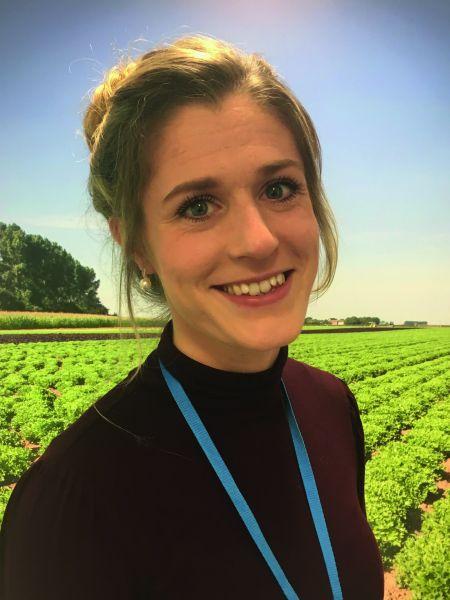
Protect the national pig herd by joining the Significant Diseases Charter

Disease control relies on collaboration and fast communication among pig keepers and vets, and the Significant Diseases Charter plays an important role in doing so. Charter membership enables fast communication in the event of an outbreak of swine dysentery or porcine epidemic diarrhoea virus (PEDv) to help contain the outbreak and protect the whole pig industry. Both these diseases cause damage to pigs’intestines, resulting in severe diarrhoea, weight loss and piglet death.
Swine dysentery and PEDv can affect all pigs, so it is important that pig keepers of any size are aware of the symptoms and are members of the charter. Swine dysentery is a particular threat to farms selling pigs for breeding. If these farms become infected, their international and UK trade is devastated.An infected pig farm not only threatens other local farms, but also farms in other regions due to the spread of disease on vehicles and by pig movements e.g. at shows or when pigs are loaned.As a member of the charter, you will receive an email if a case of swine dysentery or PEDv is confirmed in your region.This is to make sure all pig keepers, of both commercial and small-scale enterprises, are informed quickly and accurately of an outbreak in their area so they can be extra vigilant.The disease alert will inform you of the postcode outcode (first four digits) of the outbreak, the county, details about the disease and next steps.Your personal details will not be shared with other charter members or external bodies.
The charter is here to help prevent the spread of disease and to protect the industry. If you aren’t already a member, we encourage you to sign up today. Find out more about the Significant Diseases Charter and sign up HERE or you can email Pig.Health@ahdb.org.uk for more information.
AHDB Senior Animal
Lauren Cordingley
Health & Welfare Scientist
OSBPG Breeders Directory

England
Name: Leanne Edwards
Tel: 07505011626
Email: edwardsandco@hotmail.com
County: Bristol
Name:Aimee & Stephen
Edmond
Tel: 07968 463599
Email:
info@poppyfieldscornwall.co.uk
County: Cornwall
Name: Ian and Katharine
Coleman
Tel: 07813444517
Email: stkittsfarm@hotmail.com
County: Cornwall
Name: Charles Upham
Tel: 07812103448
Email: langallerfarm@gmail.com
County: Devon
Name: EveAtkins
Tel: 07944522219
Email: info@thethreelocksfarm.co.uk
County: Buckinghamshire
Name: Justin Newman
Tel: 07977249386
Email: tamartrades@gmail.com
County: Cornwall
Name: Deborah Nisbet
Tel: 07866366532
Email: deborahnisbet@yahoo.co.uk
County: Cheshire West and Chester
Name: Hannah Coad
Tel: 07453328162
Email: hannah.coad@hotmail.co.uk
County: Cornwall
Name: Lisa Corcoran
Tel: 07826051175
Email: lisaberry316@gmail.com
County: County Durham
Name: Beth Hallam
Tel: 07557803316
Email: elizabethhallam1@gmail.com
County: Devon
Name: Christopher Moss
Tel: 07736150503
Email: mossprecision@btconnect.com
County: Cumbria
Name: Maggi Gardiner
Tel: 07891524711
Email: maggigardiner@hotmail.com
County: Devon
Name: Kim Brook
Tel: 01566783232
Email: kim@kbrook.co.uk
County: Devon
Name: Katie Cooper
Tel: 07572965381
Email: klbrooks@hotmail.co.uk
County: Dorset
Name: Nicola & Mark Johnson
Tel: 07745003520
Email: nicthomason@hotmail.com
County: Essex
Name: Lillie Smith
Tel: 07551256325
Email: smithlandandlivestock@outlook.com
County: Dorset
Name: Sarah Claffey
Tel: 07766408373
Email: sarah_claffey@yahoo.co.uk
County: East Sussex
Name: Wowie Dunnings
Tel: 07799661266
Email: wowie@wolfhanger.co.uk
County: Dorset
Name: Lucy Middleton
Tel: 07985732753
Email: lucyparadiseproduce@gmail.com
County: EastYorkshire
Name: Emma Costley-White
Tel: 07966255631
Email: emma@scrubditchcarefarm.org.uk
County: Gloucestershire
England (continued)
Name: Lucy Ball
Tel: 07977665073
Email: mball.3@aol.co.uk
County: Gloucestershire
Name: Kelly wright
Tel: 07775176403
Email: cotleafarm@gmail.com
County: Lancashire
Name: Natasha Powell
Tel: 07866541088
Email: natasha-j101@hotmail.co.uk
County: Herefordshire
Name: CliveAllcorn
Tel: 07805067114
Email: angela.pratt@watamu.co.uk
County: Kent
Name: Kevin Jackson
Tel: 07973424833
Email: wilties@hotmail.co.uk
County: Leicestershire
Name: Heber Hargreaves
Tel: 07834986171
Email: hargreavesheber@googlemail.com
County: Lancashire
Name:Andrew O'Shea
Tel: 07590381188
Email: Enquiries@slatehousefarm.co.uk
County: Lincolnshire
Name: Mike & Jayne Carter
Tel: 07533410068
Email: ryecroftrarebreeds@outlook.com
County: Lancashire
Name: Russell Gleeson
Tel: 07968769251
Email: russ.gleeson@gmail.com
County: Lincolnshire
Name: Lucy Kenney
Tel: 07570137133
Email: lucy.kenney@btinternet.com
County: Lincolnshire
Name: Sally Dunkley
Tel: 01653694530
Email: hello@thedoodales.co.uk
County: NorthYorkshire
Name:Andrew Rock
Tel: 07539038574
Email: rock.sunnyside@sky.com
County: Lincolnshire
Name: Scott Lynas
Tel: 07730391441
Email: scottlynas1990@gmail.com
County: NorthYorkshire
Name: Jessie Chapman
Tel:
Email: jessiechapman@rocketmail.com
County: Loughborough
Name: DarrenAshton
Tel: 07368888422
Email: darrenashton1@gmail.com
County: nottinghamshire
Name: Harry Bowler
Tel: 07957394684
Email: littlewildfarm@outlook.com
County: Oxford
Name: Mrs PM Pimlott
Tel: 074503588120
Email: beef@parkhillfarm.co.uk
County: Shropshire
Name: MandyAbberley
Tel: 07903765292
Email: abberleyfarm22@gmail.com

County: Oxfordshire
Name: Barbara & John King
Tel: 07561822306
Email: basouthcombe@icloud.com
County: Somerset
Name: Ian Lawrence
Tel: 07857648199
Email: oldlands.osb@btinternet.com
County: Oxfordshire
Name: Louise Lyons
Tel: 07779298468
Email: reddeerfarm@hotmail.com
County: Somerset
England (Continued)
Name: Harriet Gallagher
Tel: 07949977134
Email: harrietmarshall@icloud.com
County: Somerset
Name: Dawn Horler
Tel: 07977665073
Email: motormend@hotmail.com
County: Somerset
Name: Linda Hricko
Tel: 07528018668
Email: ash.paddocks@gmail.com
County: Warwickshire
Name: Daniel McSorley
Tel: 07787590856
Email: dan@CholdertonRareBreedsFarm.com
County: Wiltshire
Name: Dawn Stevens
Tel: 07502226843
Email: kinecroftsmallholding1@hotmail.co.uk
County: Wiltshire
Name: Rachel Rivers
Tel: 07795908450
Email: Rachel.rivers.lawnfarm@gmail.com County: Wiltshire
Ireland
Name: Stuart & Kim Cooke
Tel: 003538740251890
Email: stuartcooke86@yahoo.co.uk
County: Cork
Name: Catherine & Kieran
Roseblade
Tel: 00353858629769
Email: ruaircsfarm@gmail.com
County: Galway
Northern Ireland
Name: James Girvan
Tel: 07703176140
Email: jamesgirvan@hotmail.co.uk
County: CountyArmagh
Name: Robbie Neill
Tel: 07762194559
Email: stonebridgesuffolks@hotmail.co.uk

County: County Down
Name: Lucy Blumberg
Tel: 07896723913
Email: blum93@icloud.com
County: Worcestershire
Name: Liz Hinton
Tel: 07717872444
Email: lizhinton@doctors.org.uk
County: Worcestershire
Name: Gerard Rynne
Tel: 00353831482798
Email: inaghfreerangefarm@gmail.com
County: County Clare
Name:AndrewAgnew
Tel:
Email: whitemountainpork@gmail.com
County: Louth
Name: DermotAllen
Tel: 00353872516623
Email: winetavernfarm@gmail.com
County: County Wicklow
Name: Chris Skelly
Tel: 07849555290
Email: cskelly44@hotmail.com
County: CountyArmagh
Name:Abby Davidson
Tel: 07724443108
Email: abbyd65@gmail.com
County: County Down
Scotland
Name: Graham andAlice
Lennox
Tel: 01224875879
Email: dooniesfarm1@gmail.com
County: Aberdeen
Name: Fairhill Services Ltd
Tel: 07778568336
Email: rabfair@gmail.com
County: Dumfries and Galloway
Name: Jane &Adam Mason
Tel: 01456486738
Email: lynemhorcroft@gmail.com
County: Inverness-shire
Name:Anita Withers
Tel: 07718302681
Email: cliftonlodgesmallholding@gmail.com
County: Roxburghshire
Wales
Name: MABeasley
Tel: 07776292813
Email: mark.swimming@btinternet.com
County: Cardiganshire
Name: Mick Larkin
Tel: 07525423557
Email: mickjlarkin@btinternet.com
County: Gwynedd
Name: Mary Benfield
Tel: 01492518713
Email: gbenfi1021@aol.com
County: North Wales
Name: Iolo White
Tel: 07815795806
Email: iolowhite87@gmail.com
County: Powys
Name: Fiona MacLennan
Tel: 07783116399
Email: fiona@diverseecology.co.uk

County: Argyll
Name: Clemancy Shadbolt
Tel: 07762317580
Email: keeperscottageandkennels@gmail.co m
County: East Lothian
Name: Scott Morrison
Tel: 01851643487
Email: westhavenpork@gmail.com
County: Isle Lewis
Name: Sue Goodwin
Tel: 07900036019
Email: taigilly@yahoo.co.uk
County: Scottish Borders
Name: Robert M Fair
Tel: 07778568336
Email: rabfair@gmail.com
County: Dumfries and Galloway
Name:Alex Humphreys
Tel: 07454335556
Email: alex@balgoneestate.co.uk
County: East Lothian
Name: Bob Pratley
Tel: 07834365959
Email: bob@tullich-highland.co.uk
County: Ross-shire,
Name: Kerrie Chalmers
Tel: 07875726063
Email: kerrie.chalmers@btinternet.com
County: SouthAyrshire
Name: Nic & Dave Rae
Tel: 01492580989
Email: nicolarae@hotmail.com
County: Conwy
Name: Nicola Wardle
Tel: 01690710093
Email: nantganolfarm@gmail.com
County: Llanrwst
Name:Aden Foster
Tel: 07493107731
Email: Sales@brandpod.co.uk
County: Powys
Name: DavidAshton
Tel: 07730899139
Email: daiashton@outlook.com
County: Powys
Name: Catherine Jones
Tel: 07856061833
Email: catherinejones1101@live.co.uk
County: Flintshire
Name: Jonathan Furber
Tel: 07973257311
Email: friarfurber@btinternet.com
County: Minsterley
Name: Richard Lea
Tel: 07779030676
Email: slichie@btinternet.com
County: Powys
Name: Lydia Johnston
Tel: 01691870511
Email: cownwyvalleyproduce2018@ gmail.com
County: Shropshire
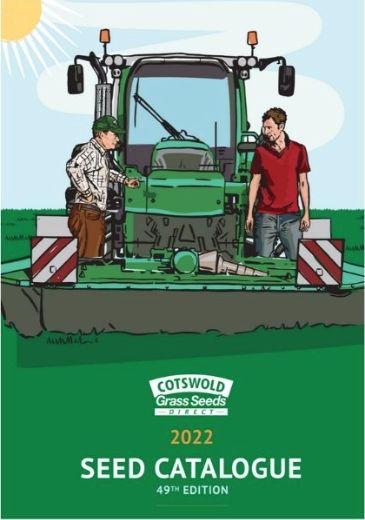








Join Us on Social Media
OSBPG Foundation Charity
YouTube Channel
Twitter Feed
Instagram Stories
Our Podcast
Pork Group

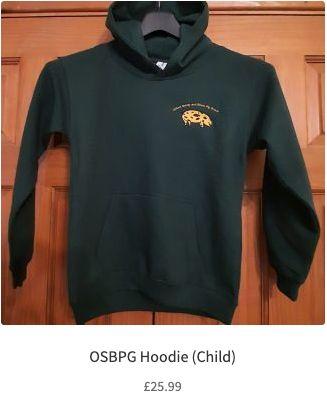
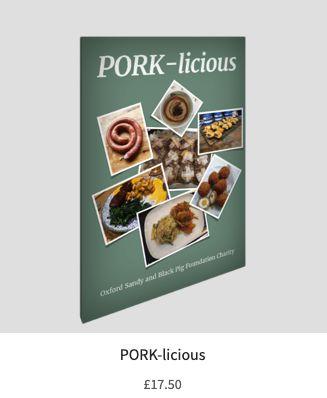
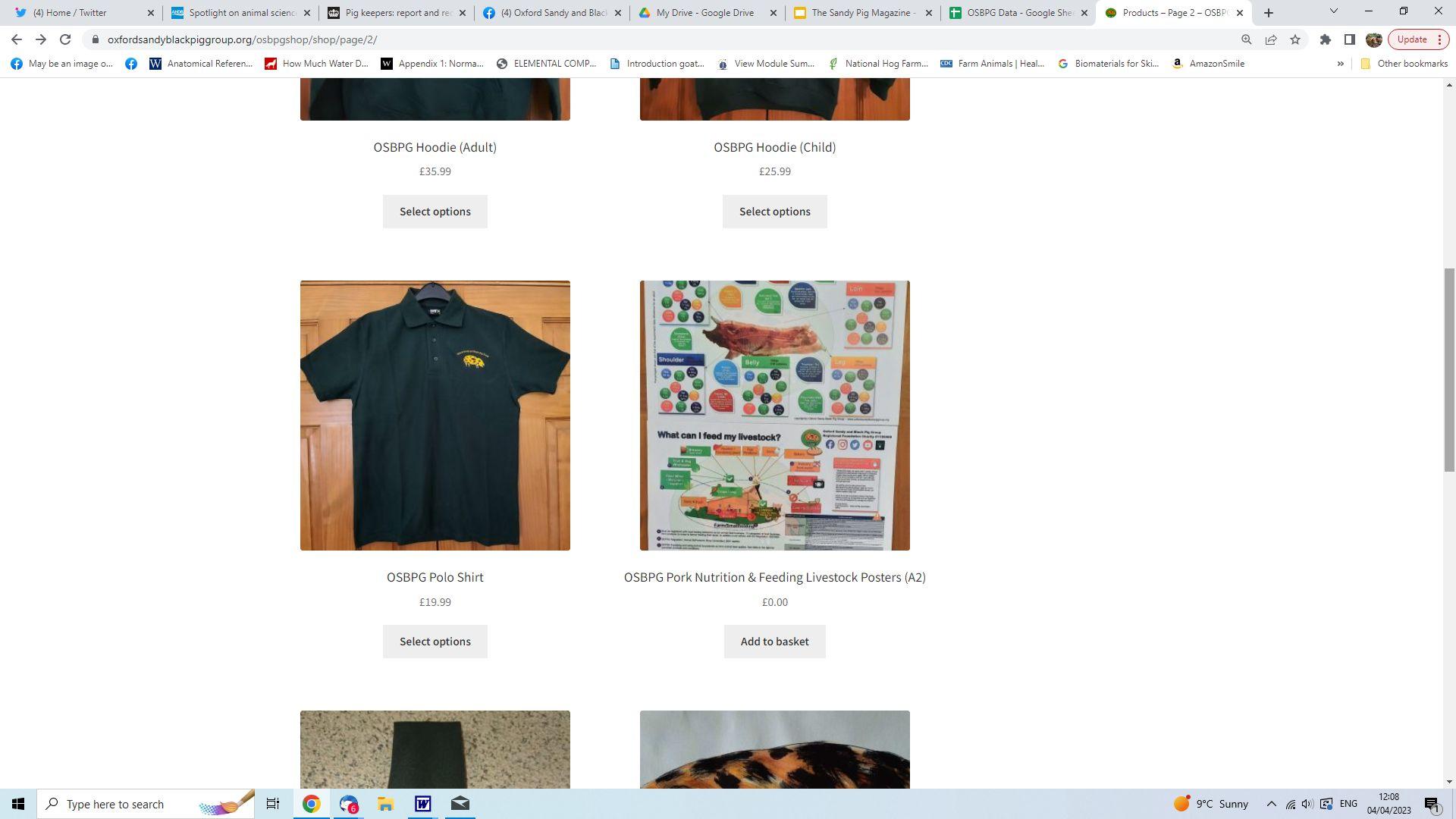






 Photo by Eugenia Porechenskaya
Oxford Sandy and Black Pig Foundation
Charity Magazine
Photo by Eugenia Porechenskaya
Oxford Sandy and Black Pig Foundation
Charity Magazine



































































 FromNatalie Revett
FromNatalie Revett









 By Bec Nutton
By Bec Nutton












